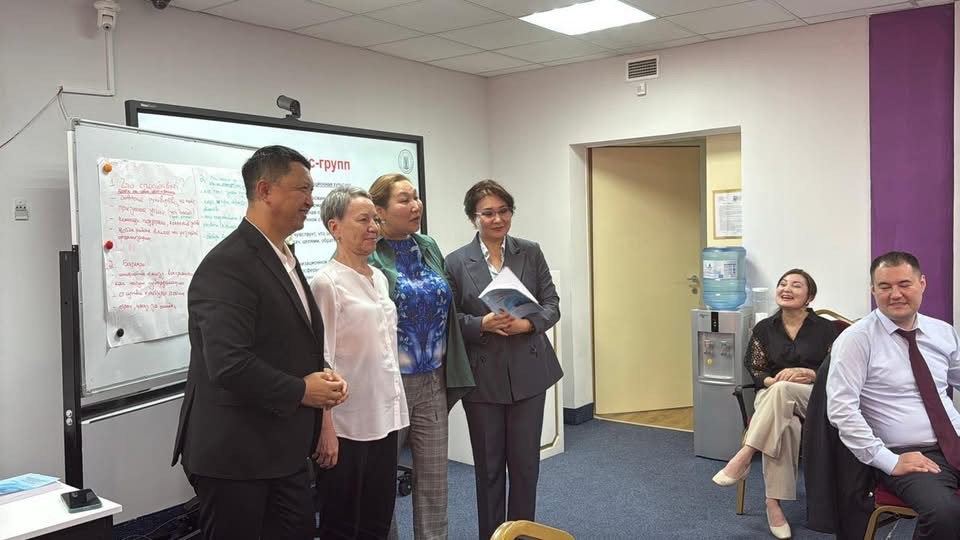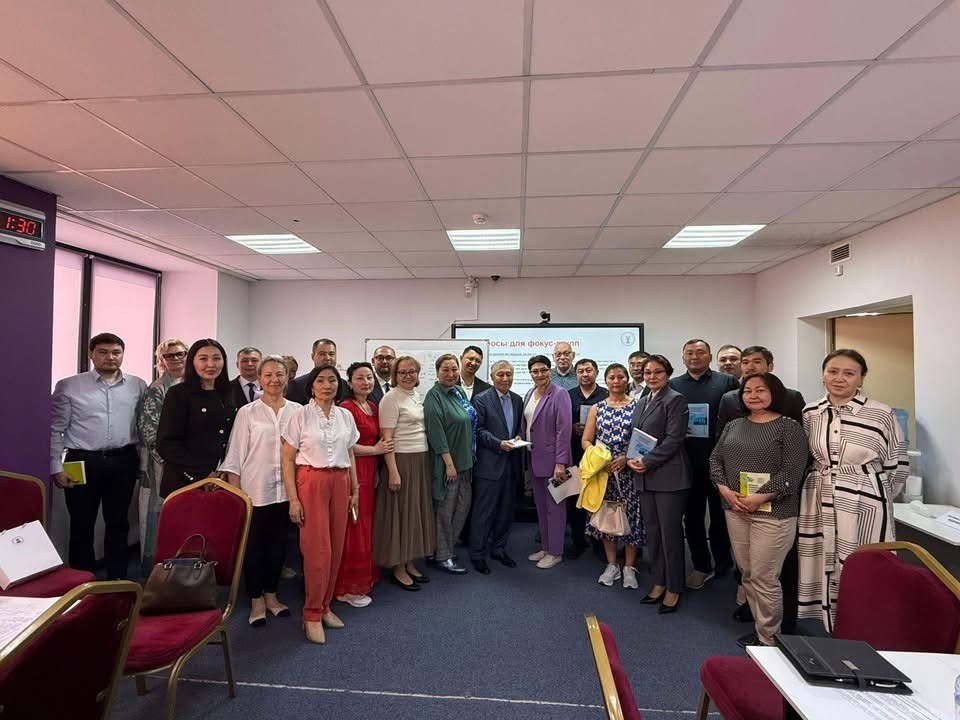- Events
On September 30, 2022, on the eve of Teacher’s Day, the grand opening of the VI season of the «Economist +» club took place. New participants were welcomed by the Director of the Institute of Management Gaipov Z.S., Professor Zeinelgabdin A.B., doctoral students DPA-20, DE-20 and undergraduates ME21.
The next season of the club was opened by holding an interactive game “New Kazakhstan: the choice is ours” between the teams «Quantum» and «Schumpeter», organized with the participation of the mentor of the ME22 group Kenesbayeva D.Zh. and mentor of the MRR22 group Ukabaeva G.K.
The host of the game was Saparbek Zhomart (ME21), who showed professionalism, creativity and communication skills. Professor Bagaraeva A.E., Associate Professor Turalin A.Z. and doctoral student Buralkieva B.B. acted as independent judges. According to their decision, the members of the Schumpeter team were determined as winners.
The leaders of the club «Economist +» – Professor Dulambayeva Raushan Tlegenovna, Kusainova Larisa Islyamovna.
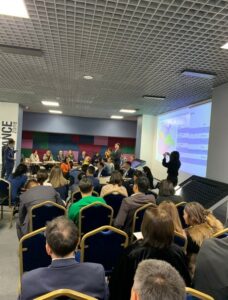
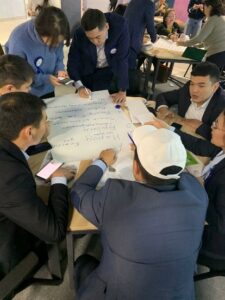
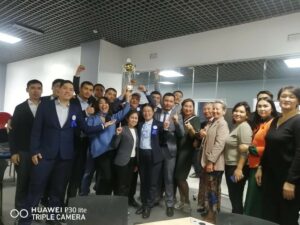
On October 6, 2022, in order to expand interaction with educational institutions and experts to solve applied problems, a memorandum of cooperation was signed between the Regional Environmental Center for Central Asia (hereinafter- RECCA) and the Academy of Public Administration under the President of the Republic of Kazakhstan (hereinafter -the Academy).
Rector Abil E.K. took part in the ceremony of signing the memorandum from the side of the Academy, and Executive Director Mr. Zafar Makhmudov from the side of RECCA.
The Academy received a game package as a gift, which was presented by the Ambassador of the European Union in Kazakhstan, H.E. Kestutis, Deputy Regional Director of the US Agency for International Development for Central Asia, USAID Ms. Maira Emata-Stokes.
The interactive simulation was developed by order of the European Union by the Polish organization Center for System Solutions. It is a facilitated process of playing 5 different water, energy and food resource management scenarios between countries located in the same river basin.
On October 6 and 7, 2022, within the framework of the implementation of the Eurasian Union project “Central Asian Dialogue to stimulate intersectoral financing based on the interaction” water-energy-food “in cooperation with the USAID Regional Water and Environment Project, a training was held on the Economist+ interactive platform -simulation for trainers (TOT).
The training was attended by representatives of the teaching staff, doctoral students and undergraduates of the Academy, who were awarded certificates for conducting this interactive game for civil servants, students and everyone who wants to learn how to make the best decisions for the development of the country and the preservation of the environment.
For 5 hours, the participants of the game honed their skills in establishing intersectoral, regional and international cooperation, quickly and clearly making strategic decisions for the life support of citizens, taking into account sustainable development.
This technology allows you to look at issues of food security, agricultural development, energy and economical use of water resources from different angles.
At the end of the game, the participants shared feedback on the possibility of using this tool for the development of state cases.
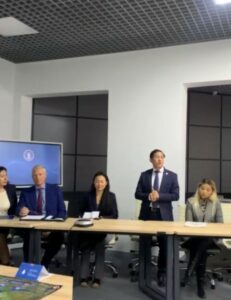
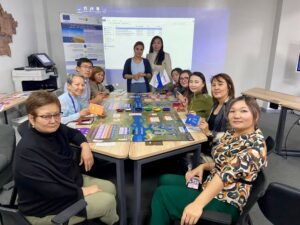
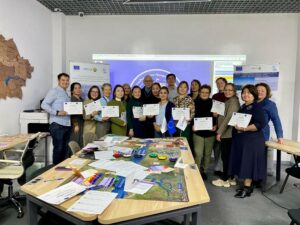
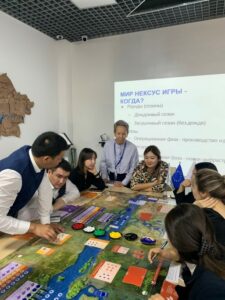
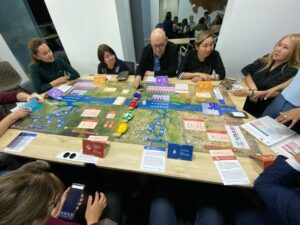
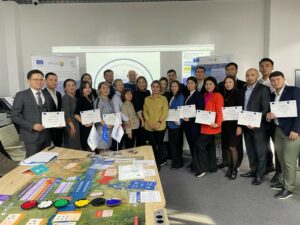
On October 14, 2022, the participants of the Economist+ club met with the international expert Dosmagambet Yergali Mukanuly on the topic “State and market since 1991in Kazakhstan”.
The speaker, who has extensive experience in public service and the scientific field, presented his own vision of overcoming the global crisis of the world economy using the method of economic and mathematical analysis of the experience of foreign developed countries.
As a result of the meeting, doctoral and master degree students of the Academy received answers to their questions on modeling, structuring scientific ideas and positions, strengthening the argumentation of their own conclusions.
During the question and answer session, Yergali Dosmagambet in his comments drew special attention to the importance of the sense of personal involvement of everyone in the introduction of new approaches in the public administration of Kazakhstan.
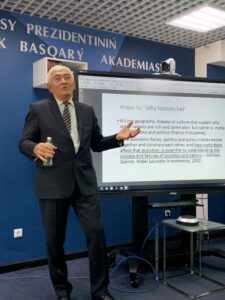
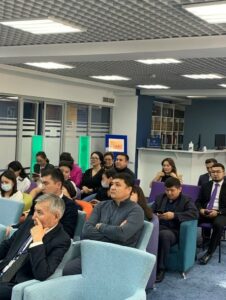
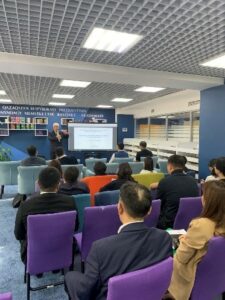
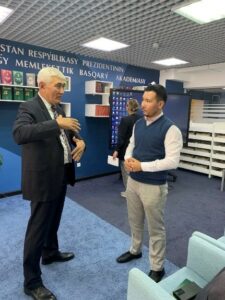
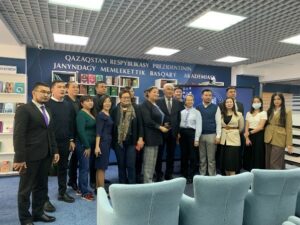
On October 28, 2022, a regular meeting of the discussion platform of the Economist+ club of the Academy of Public Administration under the President of the Republic of Kazakhstan on the topic “New trends in public administration” was held at the Astana International Financial Center.
The meeting of the club was attended by representatives of the teaching staff of the Institute of Management – Doctor of Economics, Professor R.T. Dulambaeva, Ph.D., Professor S.A. Dzhumabaev, Ph.D., professor L.I. Kusainova, representative of the Institute of Applied Research – PhD, acting Associate Professor Sh.T. Shayakhmetov, as well as undergraduates and doctoral students of the Academy.
The event was opened by T. Sembinov, head of the international business department of the Astana International Financial Center, who acquainted the participants of the discussion platform with the activities of the Center.
The judge of the specialized inter-district administrative court of Astana A. Amangeldin in his report on the topic “Peculiarities of consideration of investment disputes in the context of administrative justice” dwelled in detail on such relevant issues for civil servants as contesting decisions of state bodies (civil servants) in accordance with the Civil Procedure code of the Republic of Kazakhstan, novelties of the Administrative Procedure Code, judicial control over the execution of court decisions, including those against officials.
B. Kaziev, General Director of Kazaerospace, spoke about the role of space technologies in improving the efficiency of public administration. Of particular interest to the audience was the speaker’s demonstration of the possibilities of using a space system for remote sensing of the Earth, aerospace monitoring, including subsoil use areas and agricultural land, the use of GIS and geoanalytics in managing urban infrastructure.
Taking into account the thematic focus of the Economist+ club, A. Medetov, head of the Department of State Revenues for Astana, was invited to the discussion platform as a speaker, who spoke with the measures taken by the tax authorities to prevent the illegal export of capital abroad, about the actions of the tax authorities in detection and identification of economic violations in the face of legal entities and individuals.
Also an invited guest of the event was the chief expert-analyst of the State Register department of JSC “Information and Accounting Center” K. Sultanbekov, who presented the use of the SAAS model in public administration on the example of the digital platform Qoldau.kz, focused on the development and subsidies of the agro-industrial complex of Kazakhstan.
It should be noted that all the speeches of the speakers aroused great interest among the participants, a lively exchange of views and active questions from the audience to the speakers. For the most interesting question, the organizers awarded a valuable gift to the 1st year undergraduate student of the Academy in the specialty “Economics” D. Dzhunusova.
The main organizers of the meeting of the discussion platform of the club “Economist +” were 1st year doctoral students – G. Akhmetova, B. Mukhambetali, E. Zhangazinov, N. Karagoyshina.
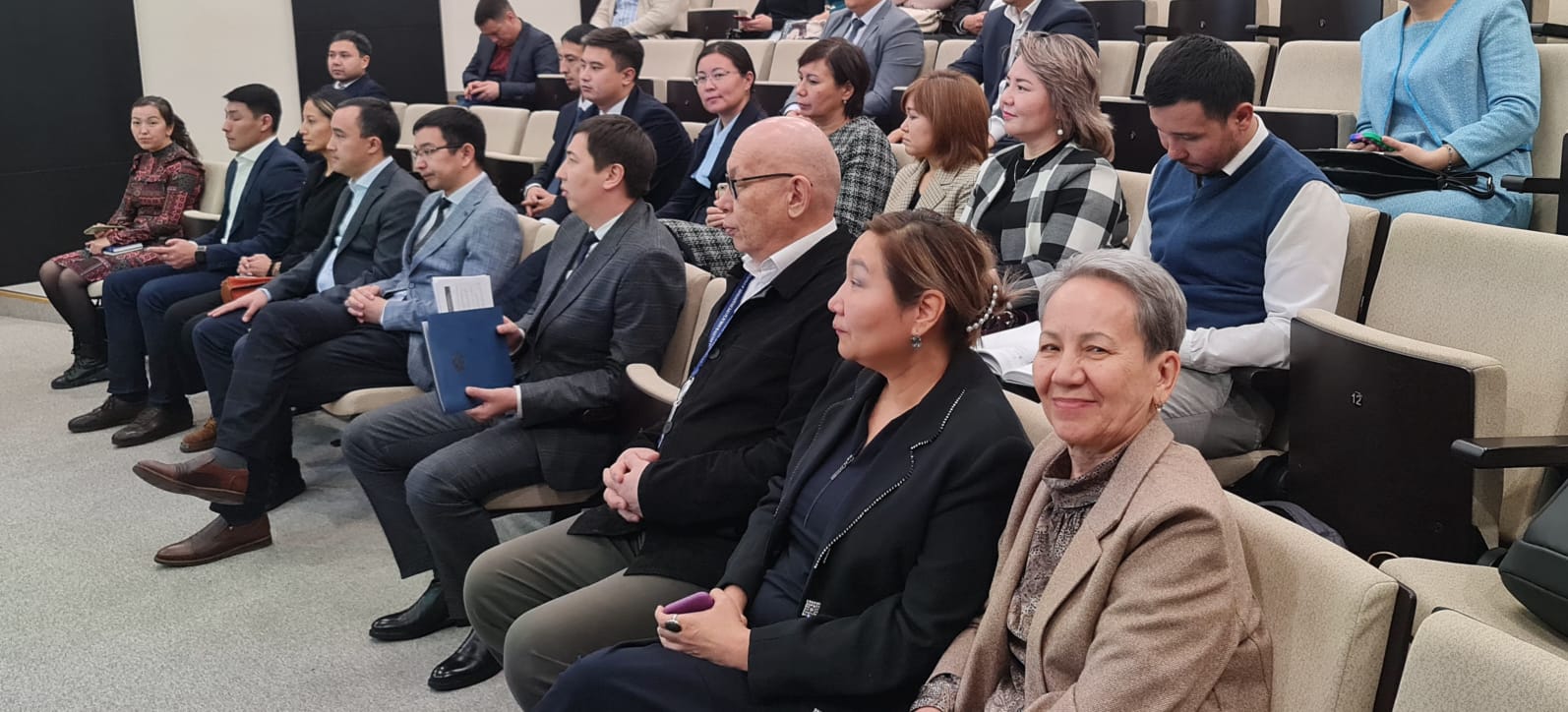
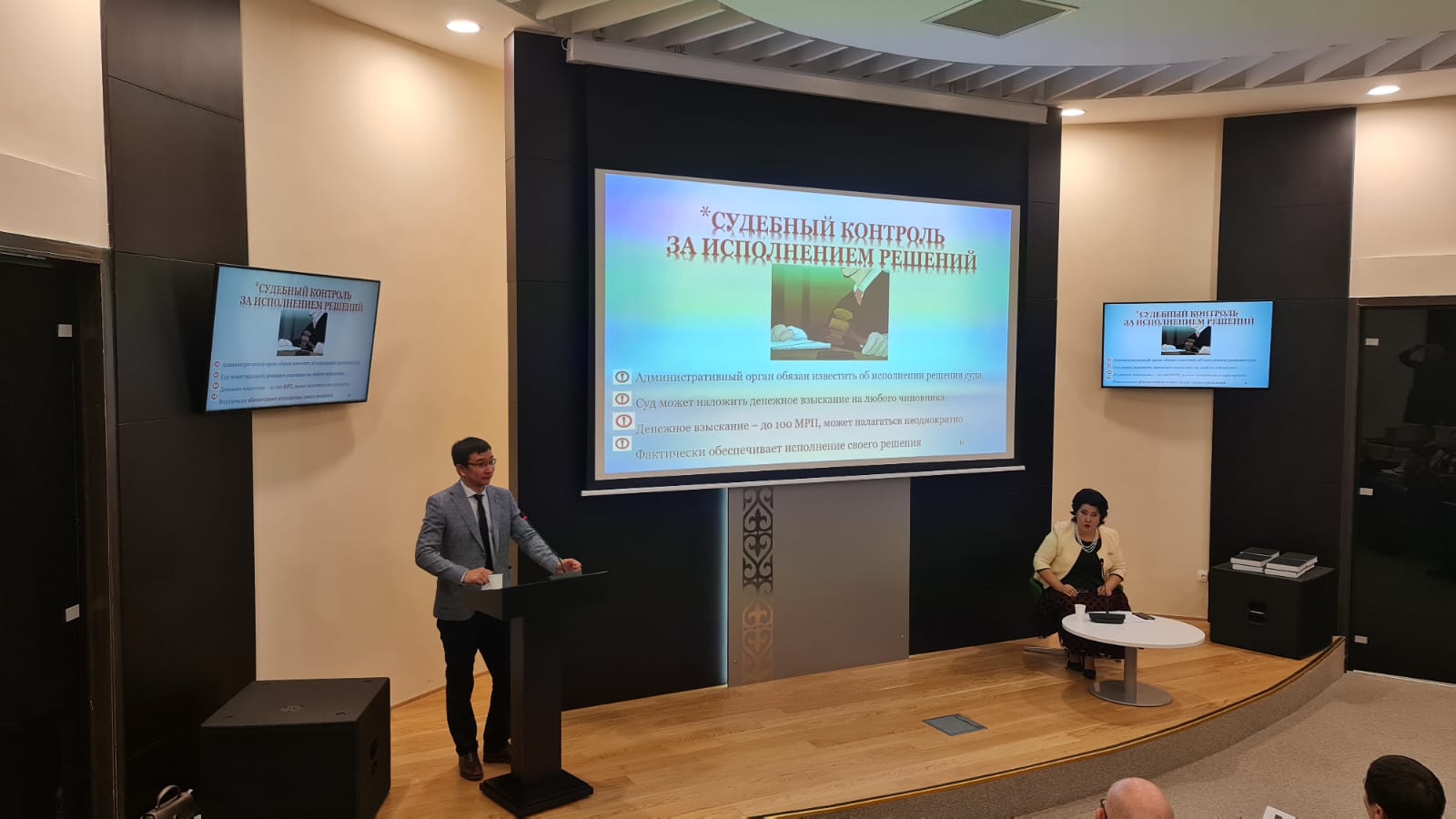
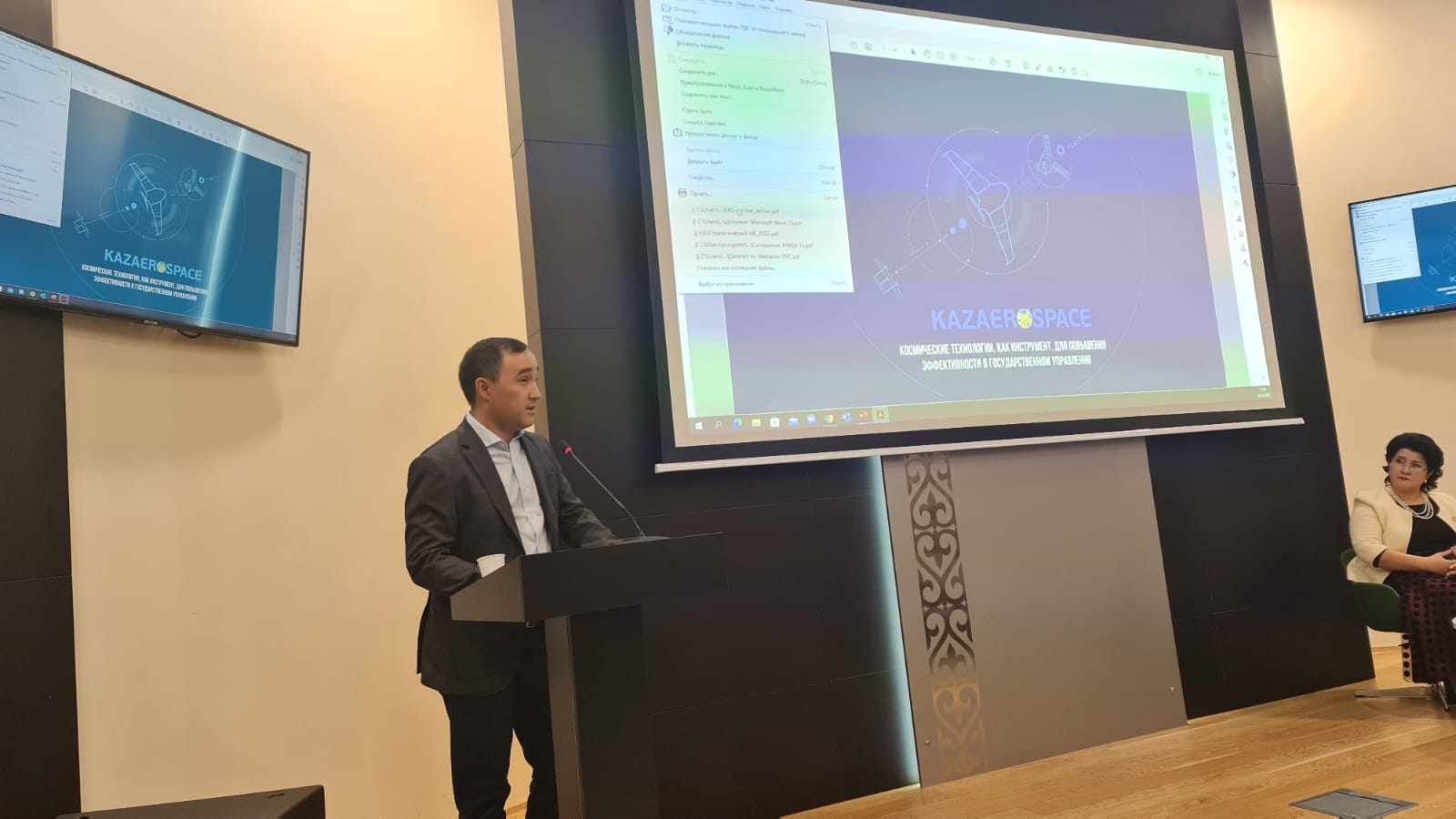
On November 4, 2022, as part of the «Development day» on the «Economist +» discussion platform, a meeting was held with the director of «MYB Consulting», PhD Dosmaganbet Yergali Mukanovich, on the topic «Research question: Life hacks from an expert».
The invited guest shared with the participants of the club meeting the methodological aspects of writing scientific papers, drawing attention to the need for an in-depth analysis of existing publications on the topic of research, the results of which form a research question. E. Dosmagambet noted that without a fundamental review of the literature it is impossible to write a good scientific work, and he revealed in detail the issues of applying economic and statistical models in research.
The guest speaker shared his personal experience and gave useful advice on self-regulation, staying up and running while doing research and, in particular, how to overcome fatigue.
During the discussion, an exchange of views took place, which allowed the audience to get answers to their questions.
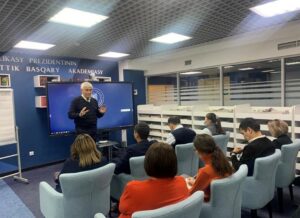
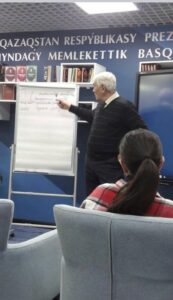
On November 11, 2022, a regular meeting of the Economist+ club was held in the business center of the Academy of Public Administration in the format of an interactive business game.
The organizer and host of the business game was a 2nd-year master’s student in the specialty «Economics» Zhomart Sarabek.
The participants of the intellectual game were undergraduates of the Institute of Management, united in two teams «Capital» (captain – Akhmetov Aidan) and «Crisis» (captain – Baysarin Margulan).
The teams competed in knowledge in such sections as «Laws of Economics», «Sustainable Development Goals», «National Accounting System», «Great scientists in history», «Riddles», «Currencies of the countries of the world». At the same time, the teams had the opportunity to choose the topic and the «weight category of the question» in points.
The meeting of the club «Economist +» was attended by Candidate of Economics, Professor Kusainova L.I., Candidate of Economics, Associate Professor Turalin A.Z., PhD, Associate Professor Ukibaeva G.K., Master of Law, assistant Ermekbayeva E.O., as well as a representative of the Institute of Applied Research – PhD, acting Associate Professor Shayakhmetova Sh.T.
According to the results of the business game, the winner was the team «Crisis», which received a special cup.
All participants of the club meeting were awarded personal diplomas.
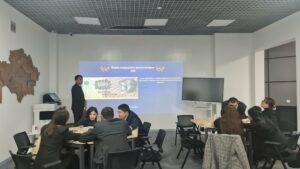
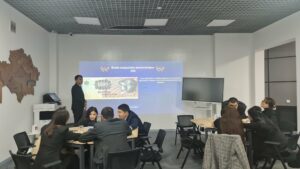
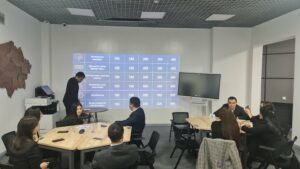
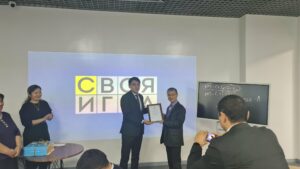
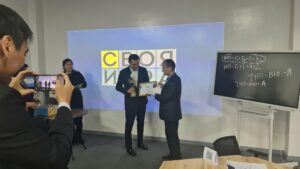
The first week of the New Year on January 13, 2023 began with the Gamification: Food Resources Management simulation on the Economist+ interactive platform.
Topical issues of food security were discussed, which are being studied within the framework of the grant project of the Committee of Science of the Ministry of Science and Higher Education of the Republic of Kazakhstan: AP14871923 Management of food security in the region in the face of global challenges based on the concept of Data Driven Decision Making.
Undergraduates ME – 22, MRR -22 showed great interest, activity and creativity in solving problematic issues of the use of water, energy and food resources.
Showing their communication, each participant justified his managerial decision.
Gamification allowed undergraduates to hone the skills of cooperation between sectors of the economy, regions, and states.
Discussing the results of the game, the audience expressed satisfaction with the ability to make strategic decisions on food security, agricultural development, energy and efficient use of water resources from different angles.
The leaders of the club “Economist +” Professor Dulambaevа R.T. and Kusainova L.I. note that certified undergraduates made strategic decisions more quickly, showed the possibilities of alternative approaches to addressing green economy issues.
Professor Dzhumabaev S.A. emphasized the importance of openness, completeness, reliability and their availability for a wide range of stakeholders.
New technologies of simulation programs are effective tools for improving the competence of decision makers.
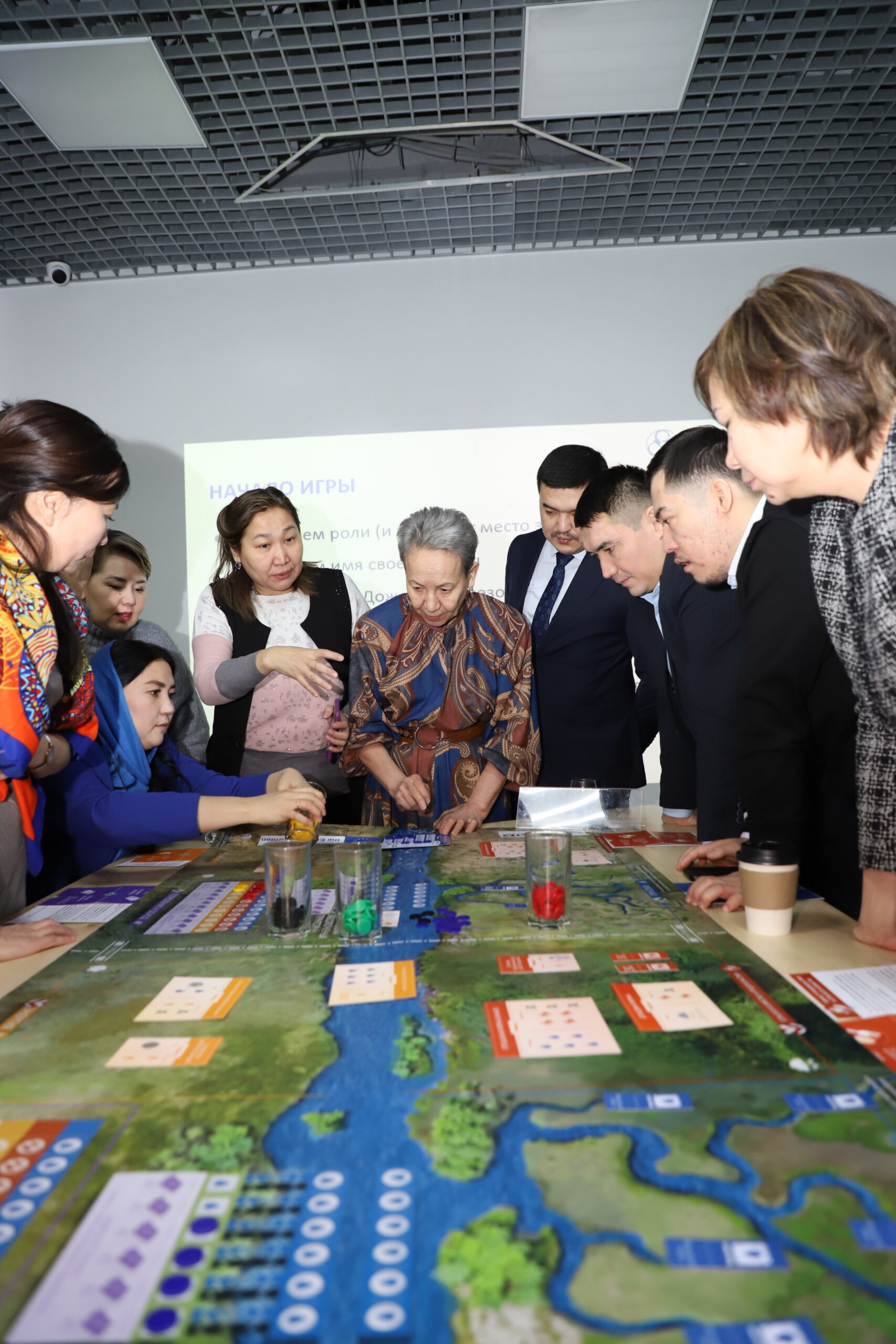


Work with the master degree students began long before the start of the game: counter questions from one group to another were formed, which made it possible to find out the level of knowledge of macroeconomics, economic policy and the high intellectual potential of students.
An expert group of undergraduates ME22 and MPP22 formulated questions of interest both for the specialty “Public Policy” and for the specialty “Economics”. These questions were corrected by the leaders of the club, Professor Dulambayeva R.T. and Kusainova L.I. and on the scoreboard the teams were already presented with new formulations.
A specific feature of these questions was that they were more aimed at the formation of logical thinking, where it was required not only to find an answer, but to bring analysis and argumentation.
This interactive game showed the ability to reasonably convince the team of the correctness of their answer, work in a team, formulate and justify their position in 30 seconds, admit defeat and continue to think actively.
Despite the fact that the game ended with a score of 55.7:42.1 in favor of the ME-22 group, the high communicative qualities of the game participants made it possible, as the host Zhusupbekov Sayat noted, to announce as a result: “Friendship won”.
The initiative of the students was shown not only in intellectual preparation, but also in the ability to technically foresee everything: the scoreboard opened the answers and questions, the stopwatch worked on the other screen, and the third screen showed the result of the game.
As a result, both teams decided that they could create an already united team that is ready to challenge a group of doctoral students to the intellectual battle, who acted as a jury in this game.
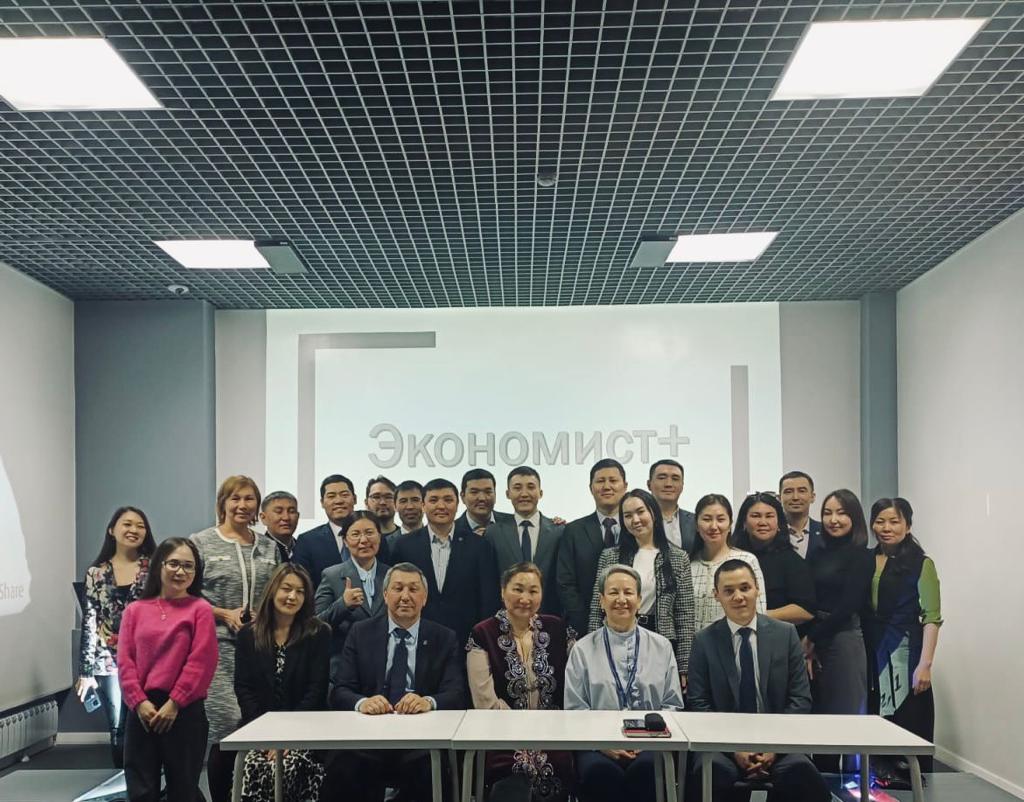
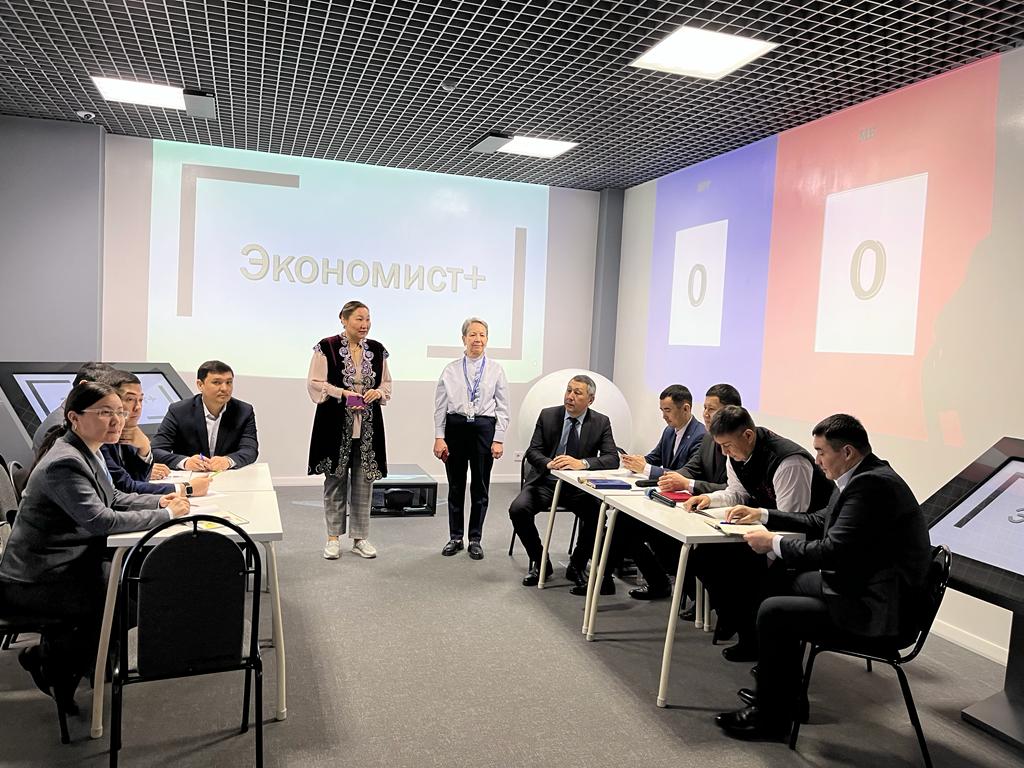
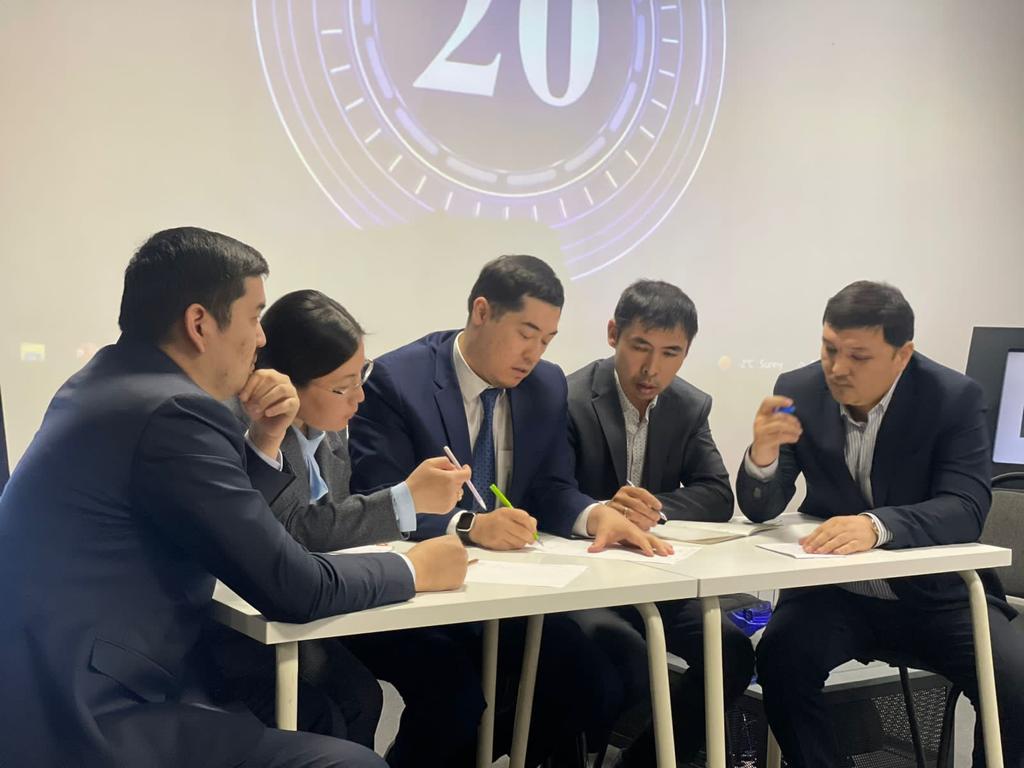
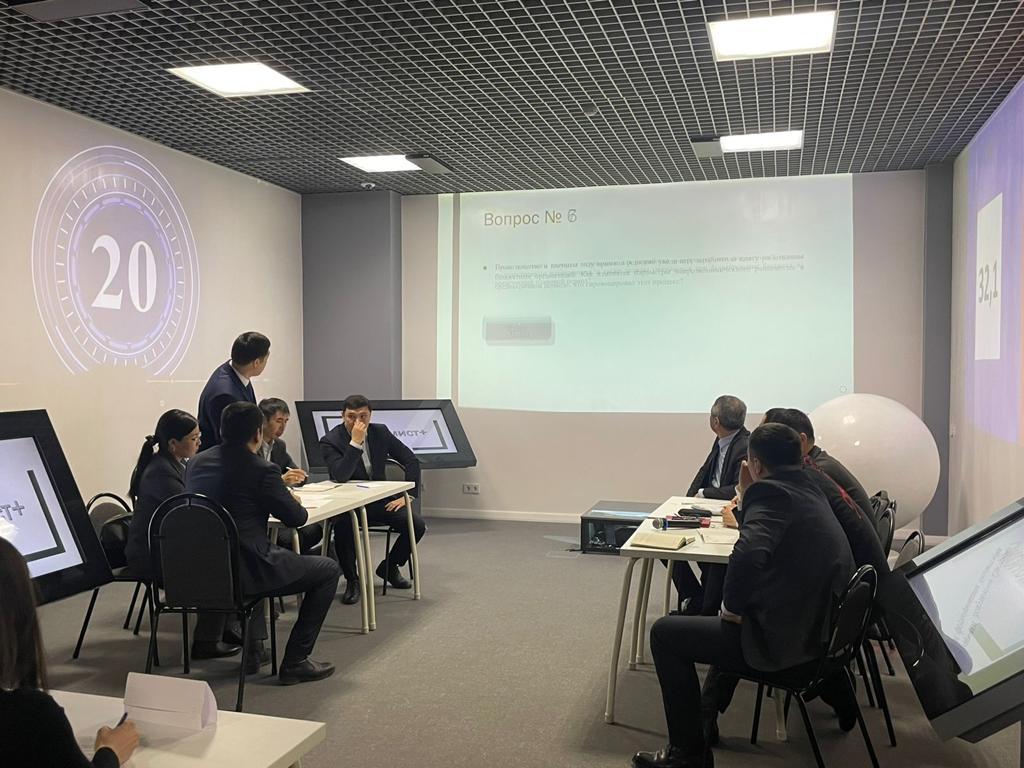
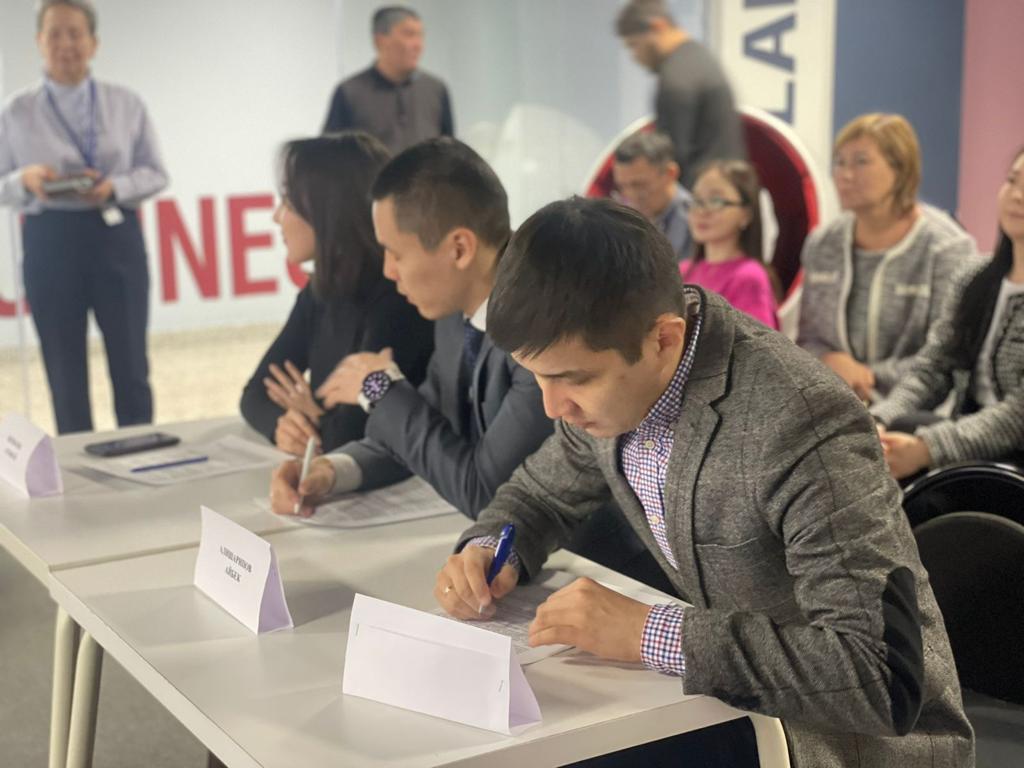
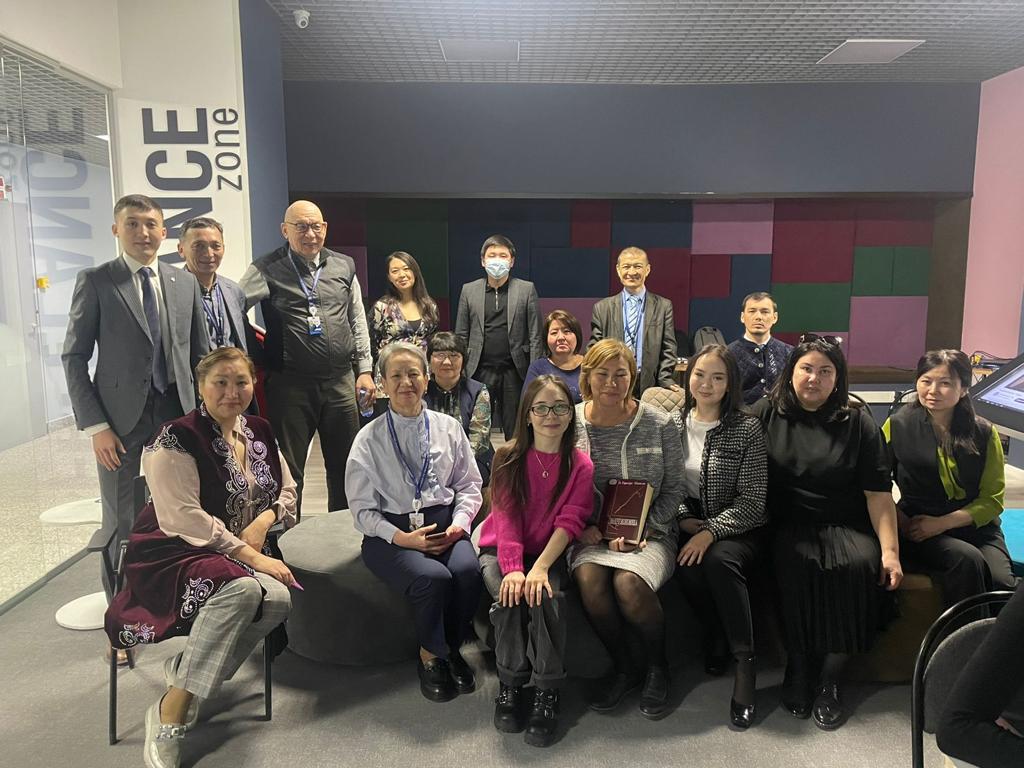
| Project Title | Discussion club “Economist +” |
| Project Managers | Dulambaeva R.T., Kusainova L.I. |
| Project Team | Dulambaeva R.T., Kusainova L.I. |
| Initiation Rationale | creation of a dialogue platform for discussing current issues of economic development and public administration |
| Project Goal | popularization of economic knowledge and development of skills of civil servants in their use in professional activities |
| Project Objectives | – conduct a discussion of trending economic processes; – develop skills in using acquired knowledge in professional activities for making effective management decisions; – improve the quality of master’s and doctoral theses; – develop skills in conducting research based on evidence-based policy (setting hypotheses, solving research questions, etc.) |
| Project Targets | Number of proposals sent to government agencies – 2 Number of meetings held – 11 Number of invited experts – 15 |
| Project Product | – Proposals for government agencies – Quality of final papers |
| Project Stakeholders | Government bodies APA under the President of the Republic of Kazakhstan |
| Project resources | Audience, IT support |
| Project Limitations | Experts’ refusal |
| Deadline | June 2024 |
| Key dates (milestones) of the project | 2.4 Friday /at the request of students |
On October 6, 2023, the Academy of Public Administration under the President of the Republic of Kazakhstan hosted the grand opening of the 6th season of the Economist + club in the form of the interactive game JEOPARDY. The new members of the ME 23 “Funny Economists” and MPP 23 “A. Smith” teams were welcomed by the Director of the Institute of Management Gaipov Z.S., Professor Dzhumabayev S.A., and our DPA-21 doctoral students, ME22 and MPP 22 master’s students also came to wish the guys good luck.
It should be noted that the master’s students of both teams had a fairly high level of training; the questions were difficult but interesting. The A. Smith team (MPP23) boldly chose questions from the “Economics” section and answered correctly, which inspires respect and gratitude for being interested in economic issues.
The ME23 team presented interesting and correct answers to fairly complex questions that required certain knowledge in specific areas, intelligence, and ingenuity.
The game was really a game, it was lively and fun thanks to our host Sayat Zhusupbekov (ME22). The Cup was won by the “Funny Economists” team, but friendship always wins!
Big respect to our jury members, professors of the Institute of Management Serikbaeva B.M., Nurmagambetov A.S., doctoral student Alisharipov A.T., master’s student Kabdullov M.Kh., who showed professionalism, honesty, and openness when evaluating the teams’ work.
We thank the teams, the organizers – the ME22 group, associate professor of the Institute of Management Ukibaeva G.K., the jury members for their active participation in this event and we encourage you to get more actively involved in the interesting world of economics+!
Club leaders, professors of the Institute of Management Dulambaeva R.T., Kusainova L.I.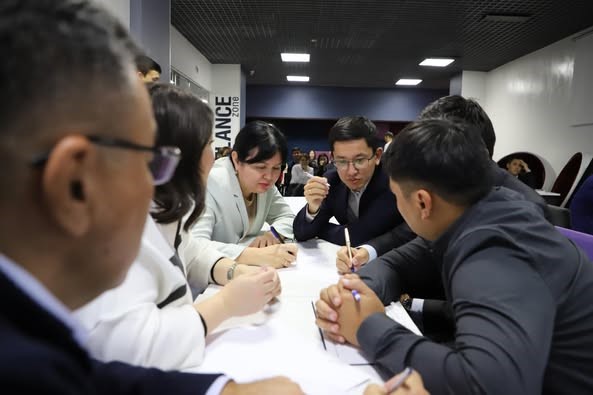
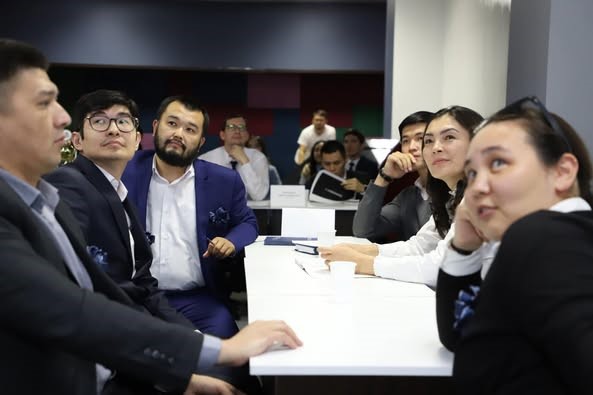
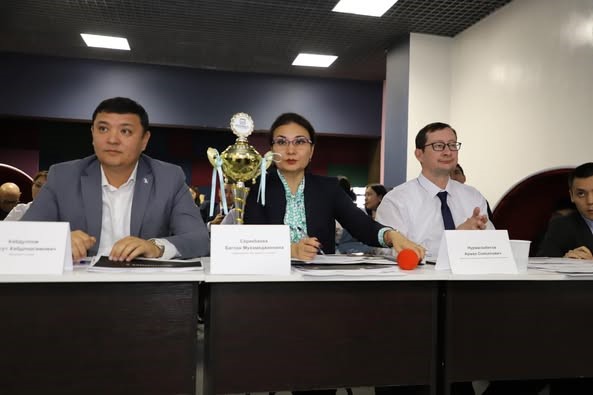
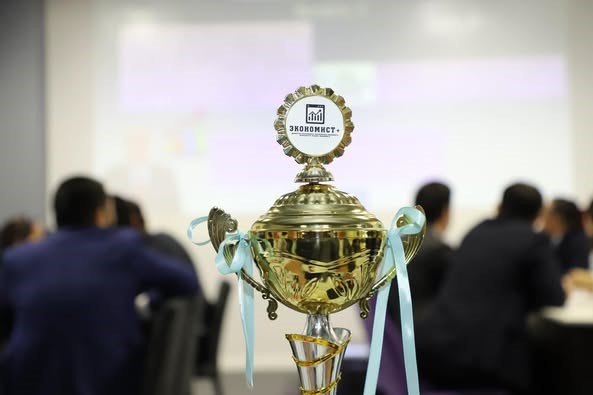
On November 10, 2023, a round table (online, offline) was held at the Economist + platform at the Academy of Public Administration under the President of the Republic of Kazakhstan, where current issues of food security and ways to solve it were discussed. The round table was held as part of the implementation of the scientific project AP14871923 “Managing regional food security in the context of global challenges based on the concept of Data Driven Decision Making” (scientific supervisor Professor Dulambaeva R.T.)
Of great interest were the speeches of invited experts represented by the director of MedHouse Kazakhstan LLP, member of the Regional Council of the Chamber of Entrepreneurs of Astana Isabaev S.K. (interests of business); member of the commission on information and analytical work of the Public Council of Astana, President of the Association of Legal Entities “Association for Relations between Business, Society and State” Uteuova A.D. (interests of the population); Head of the Department of Agro-Food Markets and Processing of Agricultural Products of the Ministry of Agriculture of the Republic of Kazakhstan Kamzin S.K. and his deputy Zhurynova S.K.
Topical issues of physical and economic accessibility of food security, improving the quality of domestic food products, forming a new policy to address issues of providing socially significant food products (SSP), improving business processes for supporting business support programs, etc. were raised
2nd year master’s students Khatepova N., Khaliullin Zh., Zhaksybekova Zh. made interesting reports, 1st year master’s students of the educational programs MRD, MRR took an active part. Many proposals and recommendations were made to address issues of ensuring food security in Kazakhstan.
The discussion identified pressing issues:
– SSP and support for the socially vulnerable population or the entire population, what should be the state policy?
– Is there a need to regulate prices for agricultural products and control the 15% markup on them, or is the market mechanism for regulating prices effective? Maybe it is necessary to increase the income of the population so that they can buy products at market prices?
– How to remove intermediaries, reduce their activities? Organize a direct chain of interaction between the farmer and the buyer of food products
– What is the reason for high food inflation? Maybe systemic measures are needed to solve these problems? Is there a need to subsidize agricultural producers? If so, it is necessary to develop mechanisms for implementing support taking into account the risks, benefits, costs.
– Increasing the role of domestic potential for the production of mineral fertilizers as a factor in improving product quality, etc.
Participants of the scientific project Dzhumabaev S.A., Kusainova L.I., Musataeva A.A. and others summed up the results of their research and highlighted new aspects of work for the coming period.
A decision was made to work together to form an analytical note on current issues of food security. Today there were heated debates at the table, various opinions, critical statements, rational proposals from all participants – representatives of business, the population, government agencies were heard.
Together – we are strong!
Club leaders, professors of the Institute of Management Dulambaeva R.T., Kusainova L.I.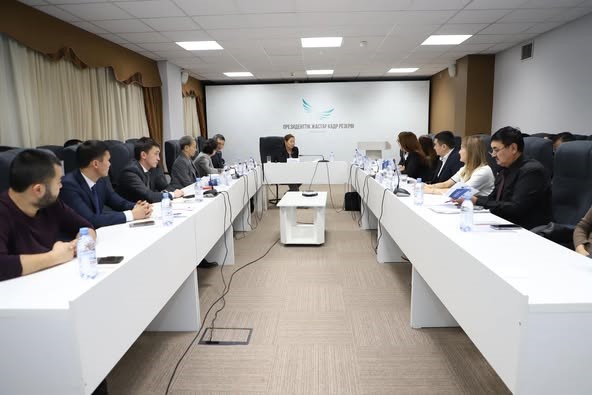

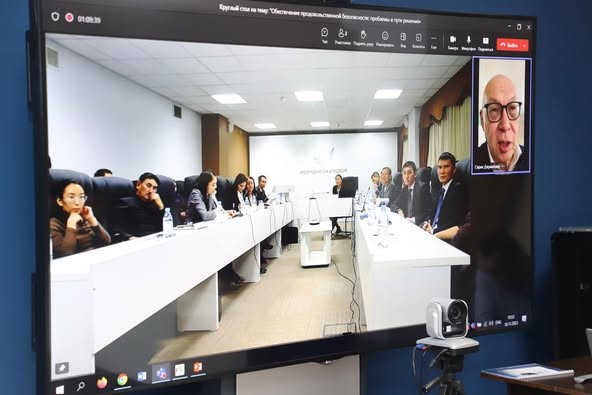
On December 1, 2023, at the request of the ME-23, MRR-23, MRR-22 master’s students, a round table was held at the Economist + platform within the framework of “Development day” to discuss current issues of the modern economy: special economic and investment zones and public-private policy.
The discussion of these topics was attended by the Executive Director of the Kazakhstan Institute of Social Research Iskakov Aziz Yerzhanovich and the Deputy Director General – Leading Researcher of the National Center for Innovation and Entrepreneurship Dana Akylbekovna Yeshimova.
The issues of the discussion were the methodology for assessing the effectiveness of existing special economic and investment zones, and the real practice of applying PPP in the Republic of Kazakhstan, comparing these phenomena with advanced foreign practices.
Professor Zhumabayev S.A., Associate Professors Ukibaeva G.K. and Serikbaeva B.M. took an active part in the discussion and in preparing the round table. and assistant Dosmagambetova A.
At the end of the meeting, an agreement was reached between the trainers and speakers to continue the discussion on an individual basis, which was the goal of the meeting of the Economist + club and its leaders Dulambaeva R.T. and Kusainova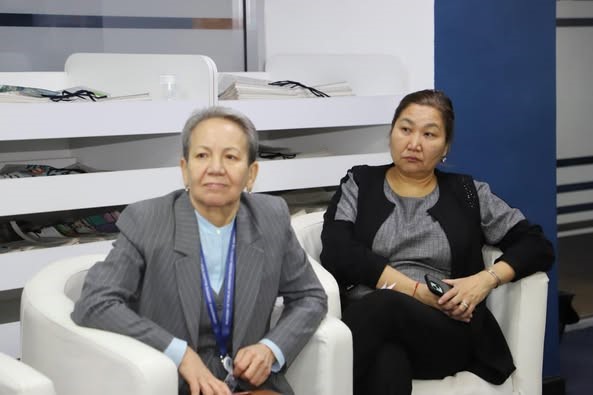
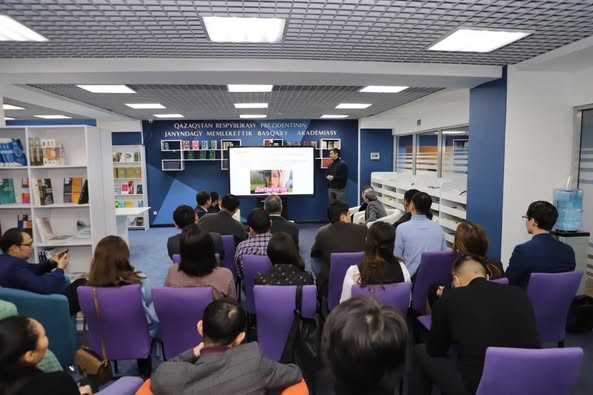
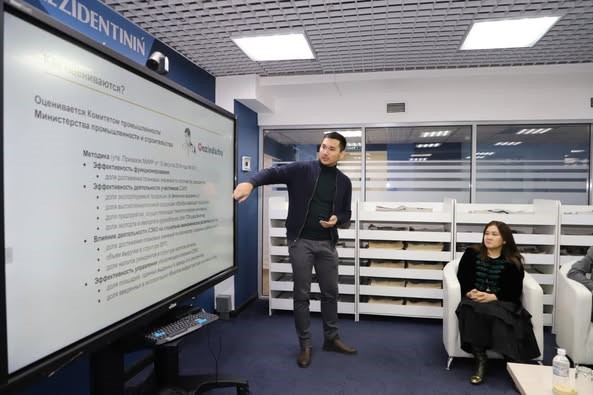
On December 8, 2023, the following task was set at the Economist+ platform at the Academy of Public Administration under the President of the Republic of Kazakhstan:
– to form a pool of experts on the ecosystem approach to making management decisions;
– learn to think strategically, treat the country, the region as a single whole, a systemic structure, where everything is connected and dependent on each other.
Countries are also in a system of relations regarding the use of water, energy, food. It is necessary to learn to hear each other in the family, at work, in the country, in the world, to make environmentally friendly, balanced decisions.
To solve these problems, a meeting was held with an expert, coordinator of international projects of USAID Marhabo Yodalieva, who agreed to conduct a training on the Nexus game with our colleagues and graduate students. This training is the second one at the Academy, and it was organized at the request of both students and teachers. And, of course, again delight, a storm of emotions, new acquaintances, insights, joy, happiness and new ideas, the desire to do something useful for our country.
We thank Arman Seipilovich, Baglan Mukhamedzhanovna, Maira Namgenovna, Ainur Muratovna, Serik Dzhumabaevich for their active participation and support of Margarita Bolegenovna in organizing this project and congratulate our talented colleagues and graduate students on receiving a European-standard certificate for successfully completing the Nexus Simulation training.
Special thanks to the coordinator of the capacity building and education component of the Nexus Project (EU) Yodalieva Markhabo for professionally conducting the training.
The Nexus Project allows for the active implementation of an integrated approach to management in the educational process and public administration. There are plans to play these simulations in government agencies with management and experts. This proposal came from our listeners. This is the result, let’s keep working! The club leaders are professors of the Institute of Management Dulambaeva R.T., Kusainova L.I.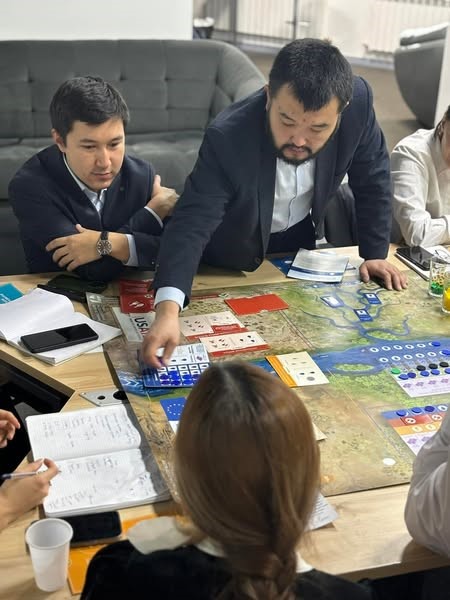
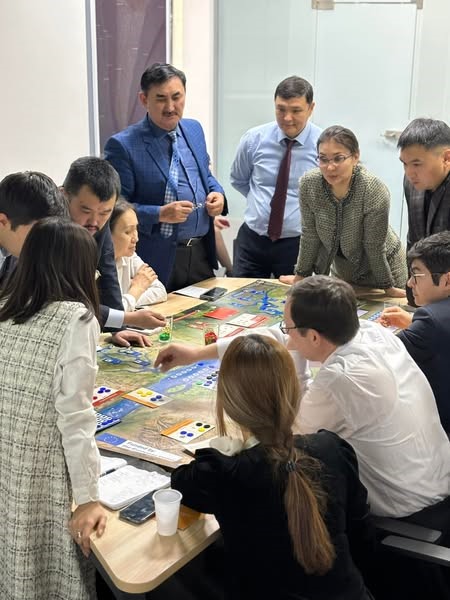
On February 9, 2024, a round table was held at the Economist + platform on the topic “Key indicators (KPI) of regional food security: a practical aspect” as part of the implementation of the scientific project “Managing regional food security in the context of global challenges based on the concept of Data Driven Decision Making”
The current message of Kassym-Jomart Tokayev was reflected in the work of experts on the development of specific mechanisms for ensuring food security at the regional level.
An expert, researcher Onerkhan Sansyzbayuly made a proposal to implement a project to promote a national brand for environmentally friendly products, their certification, and the production of a trial range of national products.
The current issues of underfunding of the agro-industrial complex, the lack of reliable data on objects and entities of the agro-industrial complex, the results of subsidies, issues of monitoring the distribution of budget funds, and the search for effective means of organizing the processes of interaction between economic entities and the state were discussed.
Deputy General Director of Concordia Group LLP Kairat Sultanbekov presented the capabilities of the information system (Koldau/Kezekte), which has been updated in terms of functions and directions.
The discussion focused on the need to use real working tools for implementing economic policy, in particular, increasing the efficiency of the farmer financing policy.
The issues of interaction between government agencies and private businesses were updated, including with the service provider company Concordia Group, which effectively performed the functions of distributing and monitoring the efficiency of budget funds, searching for alternative sources of financing, etc. The company is ready to provide the state with information services, provide access to services, but there are administrative barriers that can and should be addressed.
However, they are not being addressed, and as a result, farmers, the population, and the country suffer. The problems are identified, and specific steps are proposed to solve this problem. It is time for all of us: scientists, businesses, government agencies, NGOs, to sit down at the round table and solve such cases together. The discussion was actively attended by civil servants, roundtable speakers, guests and participants of the scientific project Asel Zhunusova, Daulet Esmagambetov
Prosperity and food security to our country!
Club leaders, professors of the Institute of Management Dulambaeva R.T., Kusainova L.I.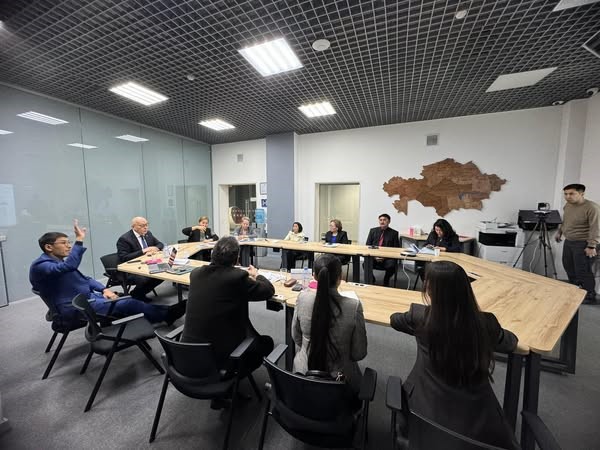
On March 1, 2024, an expert meeting in the format of a focus group on the problems of formation of real monetary income of the population was held at the dialogue platform “Economist +” of the Academy of Public Administration under the President of the Republic of Kazakhstan, where the target audience were representatives of government agencies, non-governmental organizations, businesses, experts in the field of formation of population income, our master’s and doctoral students, professors.
It turned out to be a productive discussion, a kind of brainstorming, which is actually very important for our students who are engaged in research.
Akmaral Taishykova, a 2nd year master’s student of the MRR, moderated the meeting, conducted a focus group on all requirements at a fairly high level, thus testing the results of the study.
The opinion of the experts aroused great interest, each participant contributed to today’s discussion.
The meeting program was rich, the most pressing issues of concern to the population were discussed. For example, real wage indicators, credit obligations of citizens, taxation, the subsistence minimum of citizens of the country. Objective recommendations were given to improve the well-being of residents, increase the cash income of citizens.
Master’s and doctoral students approached the problem not only as practitioners, but as researchers.
Professors Zeinelgabdina A.B., Dzhumabaeva S.A., Arystanbekov K.T., Marmontova T.V., Zhunusova A.Zh., Vitchesko V. took an active part in the discussion with valuable recommendations.
Club leaders, professors of the Institute of Management Dulambaeva R.T., Kusainova L.I.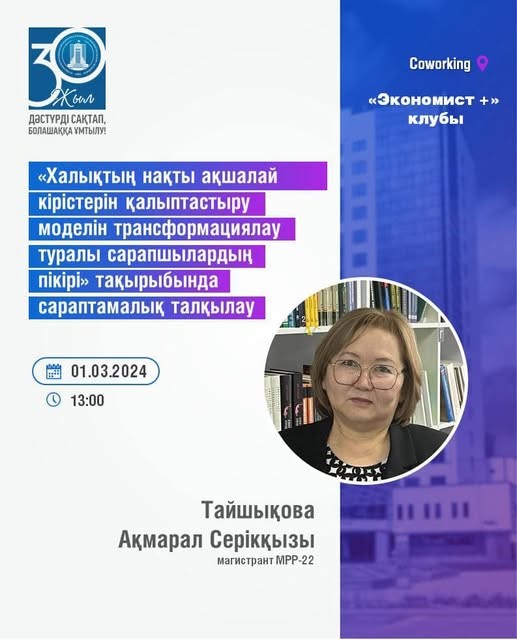
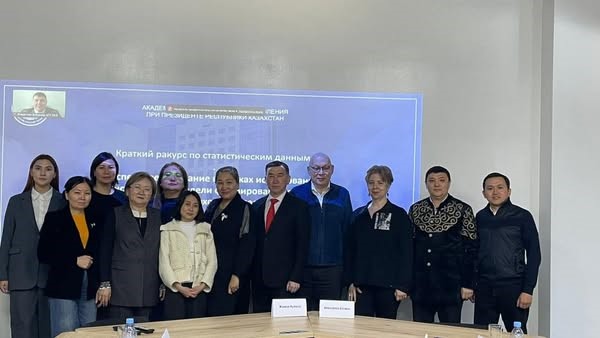
On March 29, 2024, at the dialogue platform of the Economist + club with the participation of the Kyran debate club, current issues of agricultural subsidies were discussed: pros and cons!
Two teams ME 23 (opposition), ME 22 (state) defended their positions based on real facts and data.
The speeches were based on the principles of evidence-based policy, this deserves respect for our participants, great respect to the teams!
We thank the members of the judging committee of the Agency of the Republic of Kazakhstan for Civil Service Affairs, the head of the Kyran club Ukibaev G.K. and the host Dosmagambetov A. for their competent work.
The club leaders are professors of the Institute of Management Dulambaev R.T., Kusainov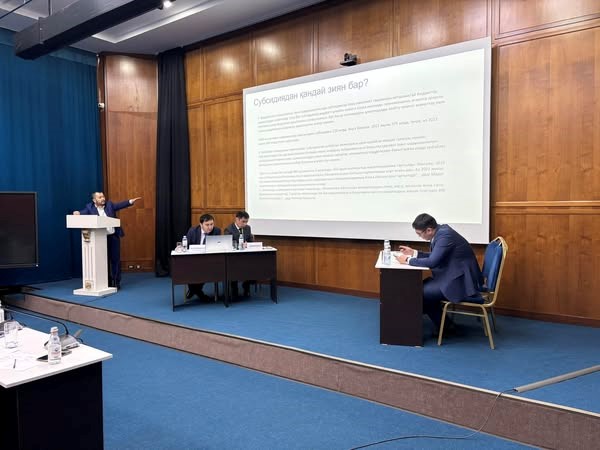
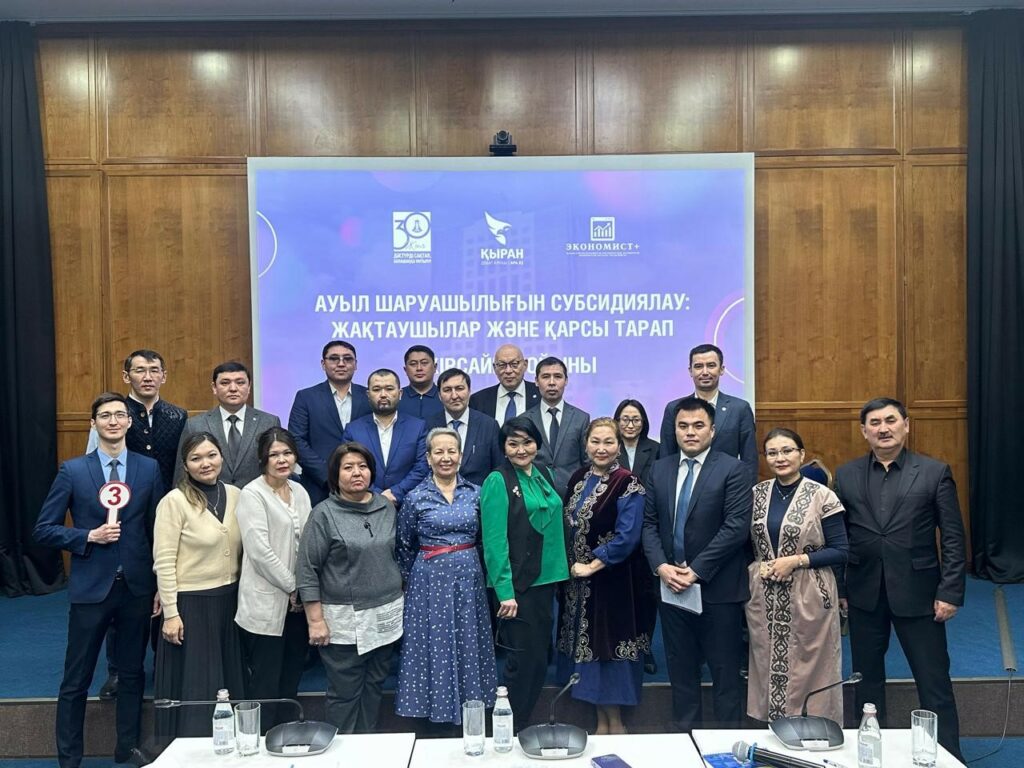
On April 5, 2024, a meeting of the Economist + club was held at the site of the Ministry of Agriculture of the Republic of Kazakhstan, master’s students of the educational programs “Public Policy” and “Economics” presented the results of their research for discussion.
Many of these master’s students joined the research group and actively participated in the implementation of a scientific project for grant funding on the problems of food security management as experts.
The result was a unique synthesis of scientific, practical, educational activities, at the round table there was an active exchange of opinions between experts, professionals from different levels of government (CSO, MIO), professors Dzhumabayev S.A., Zhunusova A.Zh., scientists.
The guys received specific recommendations, good wishes from colleagues from the Ministry of Agriculture of the Republic of Kazakhstan, directors of departments, research centers. It is very pleasant that the research results were highly appreciated by the experts of the ministry.
Constructive dialogue allowed graduates to professionally and worthily represent the Academy – 2nd year master’s students MPP-22 and ME-22 Nazgul Khatepova, Zh. Khaliullina, B. Eltaeva, N. Kuntuova, D. Zhaksybekova, M. Ospanova, N. Utegenova, A. Salamata.
The leaders of the club are professors of the Institute of Management Dulambaeva R.T., Kusainova L.I.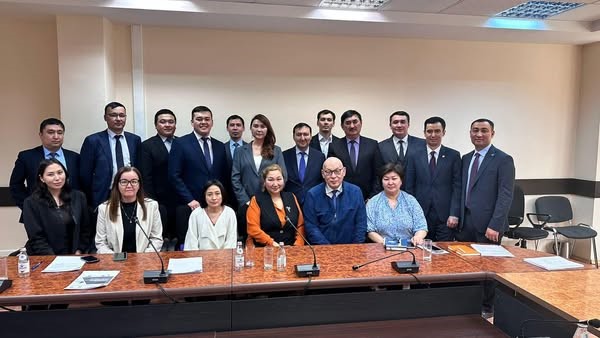
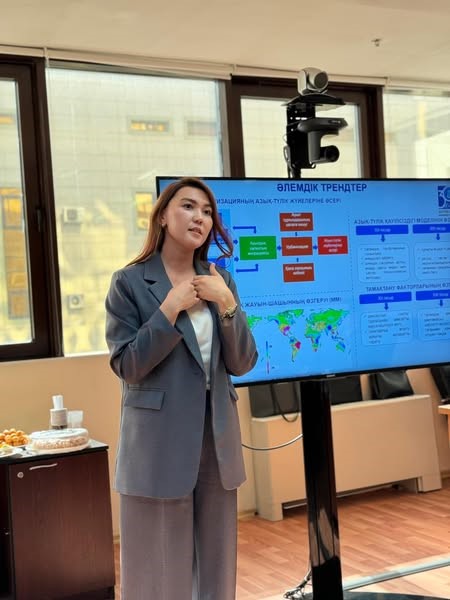
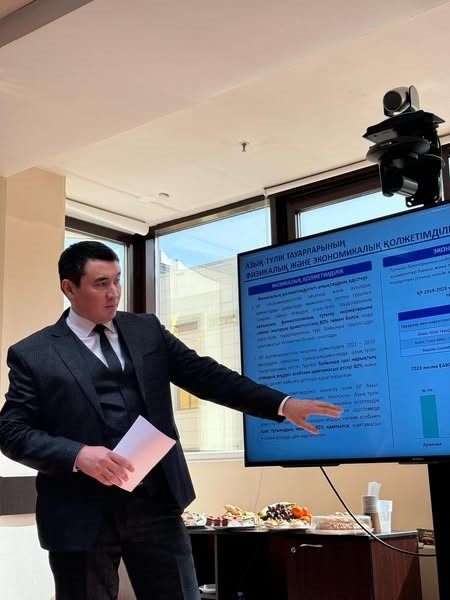
On April 12, 2024, a meeting of the Economist+ expert club was held at the site of the Eurasian Monitoring Analytical Research Center.
Scientific research at the Academy of Public Administration under the President of the Republic of Kazakhstan, on the one hand, is research by graduate students on specific problems in the areas of activity of their government agencies. On the other hand, there is research by the faculty on current pressing issues within the framework of their specialization and scientific projects. These two branches in close collaboration create products that fall into research “baskets” (there are currently 5 such “baskets” in the Academy, https://www.apa.kz/ru/about-ru/missiya-i-videnie/). Which makes the Academy a leading center for developing expert solutions in the field of public administration and public policy.
The basis for such an expert meeting was organized within the framework of the study “Improving public administration of border regions of Kazakhstan in the context of ensuring food security” (NSGP master’s student Vladimir Vitchenko).
The testing of the results of the master’s research served as the basis for discussing the current state and problems of public administration in the border regions of Kazakhstan with a focus on ensuring food security with the development of recommendations for improving the effectiveness of governance mechanisms.
The discussion was attended by professors and teachers of the Academy Dzhanenova S.A., Kasymova D.K., Abisheva M.A., Dzhumabayev S.A., Zhunusova A.Zh., Director of the Center for Analytical Research “Eurasian Monitoring” Alibek Tazhibayev, Professor of the International University of Astana, Scientific Director of the CAI “Eurasian Monitoring” Marmontova T.V., representatives of government agencies, non-governmental organizations, and businesses.
In the context of increasing threats to the stable provision of food security and independence, the quality of planning and implementation of state policy in this area is an important task. For Kazakhstan, in view of the continuing dependence on imports of a significant share of food products, machinery and equipment for agricultural production and processing industry, the basis for strengthening food security is, first of all, increasing the efficiency of the domestic agro-industrial complex and its basic industries. The level of agricultural production directly affects the state of food security of the country. The development of the agro-industrial complex of Kazakhstan in recent years has shown quite positive results, but as the influence of external threats increases, internal risks persist, and prospects for the global agro-food market develop, there is a need to optimize government support measures, stimulate integration and cooperation processes in agricultural production, and diversify production in accordance with natural, climatic, and socio-economic factors.
Due to its specificity, the agricultural sector cannot participate equally in inter-industry competition in market conditions. Relatively low-income agriculture, dependent on natural factors and having a pronounced seasonal, cyclical nature of reproduction, is a sector that is more technologically backward compared to industry and provides a lower return on invested capital.
The development of the agro-industrial complex infrastructure is also a promising task and is associated with the creation of technological systems for storing and processing agricultural raw materials in the production of environmentally friendly competitive food products. The solution to the problems of the development of the agro-industrial complex is determined by the level of financing, mainly from the state budget, which should be carried out based on the principles of strategic planning, based on concentration on significant and priority areas of increasing the competitiveness of agriculture and ensuring food security.
The participants also noted that the solution to most of the remaining problems depends on the level of research and design work.
The leaders of the club are professors of the Institute of Management Dulambaeva R.T., Kusainova L.I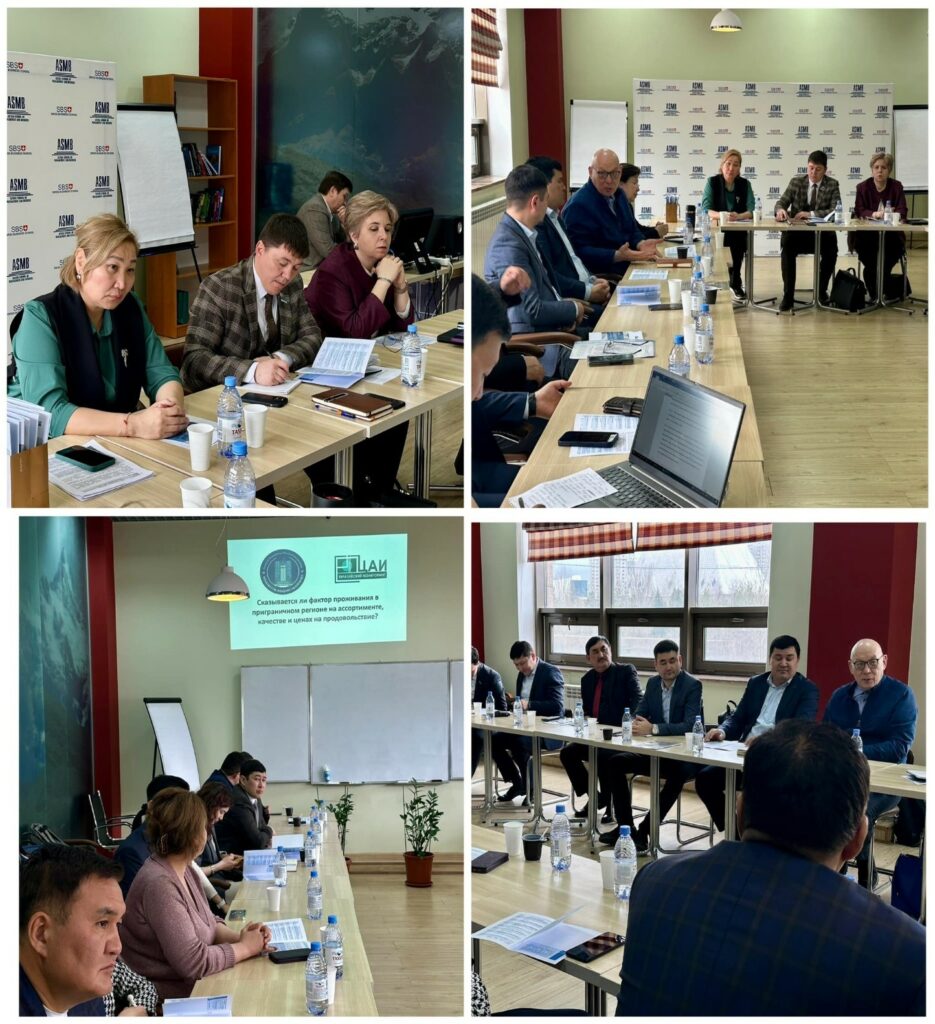
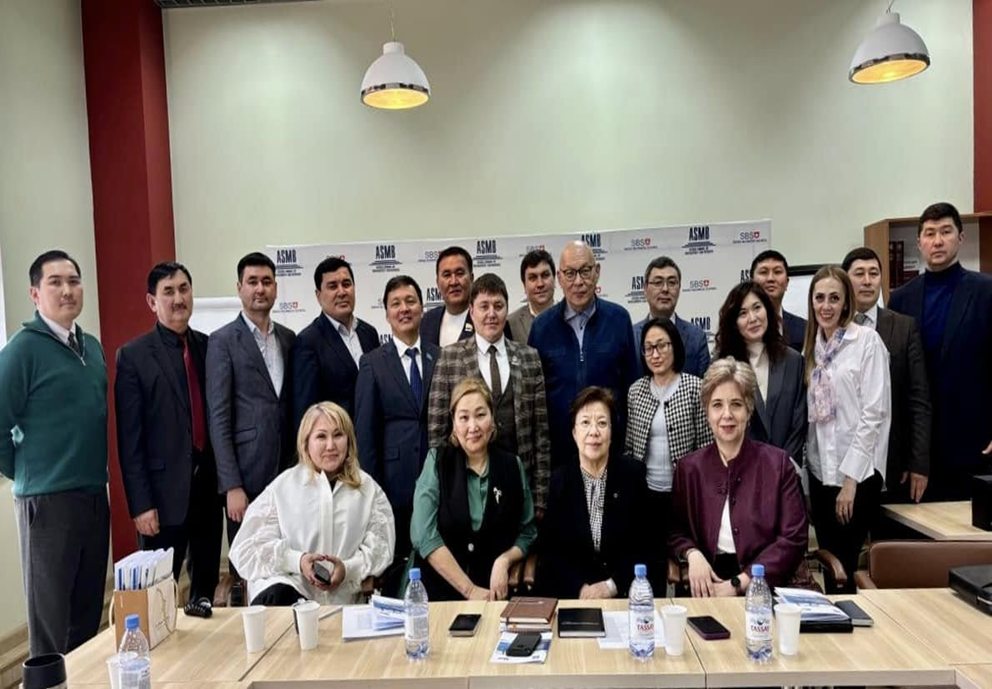
| Project Title | Discussion club “Economist +” |
| Project Managers | Dulambaeva R.T., Kusainova L.I. |
| Project Team | Dulambaeva R.T., Kusainova L.I. |
| Initiation Rationale | creation of a dialogue platform for discussing current issues of economic development and public administration |
| Project Goal | popularization of economic knowledge and development of skills of civil servants in their use in professional activities |
| Project Objectives | – conduct a discussion of trending economic processes; – develop skills in using acquired knowledge in professional activities for making effective management decisions; – improve the quality of master’s and doctoral theses; – develop skills in conducting research based on evidence-based policy (setting hypotheses, solving research questions, etc.) |
| Project Targets | Number of proposals sent to government agencies – 2 Number of meetings held – 9 Number of invited experts – 15 |
| Project Product | – Proposals for government agencies – Quality of final papers |
| Project Stakeholders | Government bodies APA under the President of the Republic of Kazakhstan |
| Project resources | Audience, IT support |
| Project Limitations | Experts’ refusal |
| Deadline | June 2025 |
| Key dates (milestones) of the project | 2.4 Friday /at the request of students |
On November 2, 2024, an off-site meeting of the Economist + club was held at the site of the situation center of the State Services Committee of the MCRIAP RK on the topic “Digital management tools: eGov development, Big Data, artificial intelligence”.
The meeting program was very rich and information was received on the digitalization of the Republic of Kazakhstan, the development of e-government, the use of “big data” and artificial intelligence, a demonstration of Smart Data Ukimet, and international cooperation.
The doctoral students and master’s students were addressed by Yusupova Ainur Abduakhasovna – Chairman of the State Services Committee of the MCRIAP RK, Isabekova Gulmira – Director of the Department of Open Data and Integration Services of JSC NIT, Galiyev Damir – Manager, Investment Projects Management of JSC NIT, Andrey Lim – Lead Data Science Engineer, Baimen Azamat – Director of the Product Promotion Department of JSC NIT. The openness of the speakers allowed the trainees to receive fairly complete answers and information on the research issues of doctoral and master’s projects.
The club leaders are professors of the Institute of Management Dulambaeva R.T., Kusainova
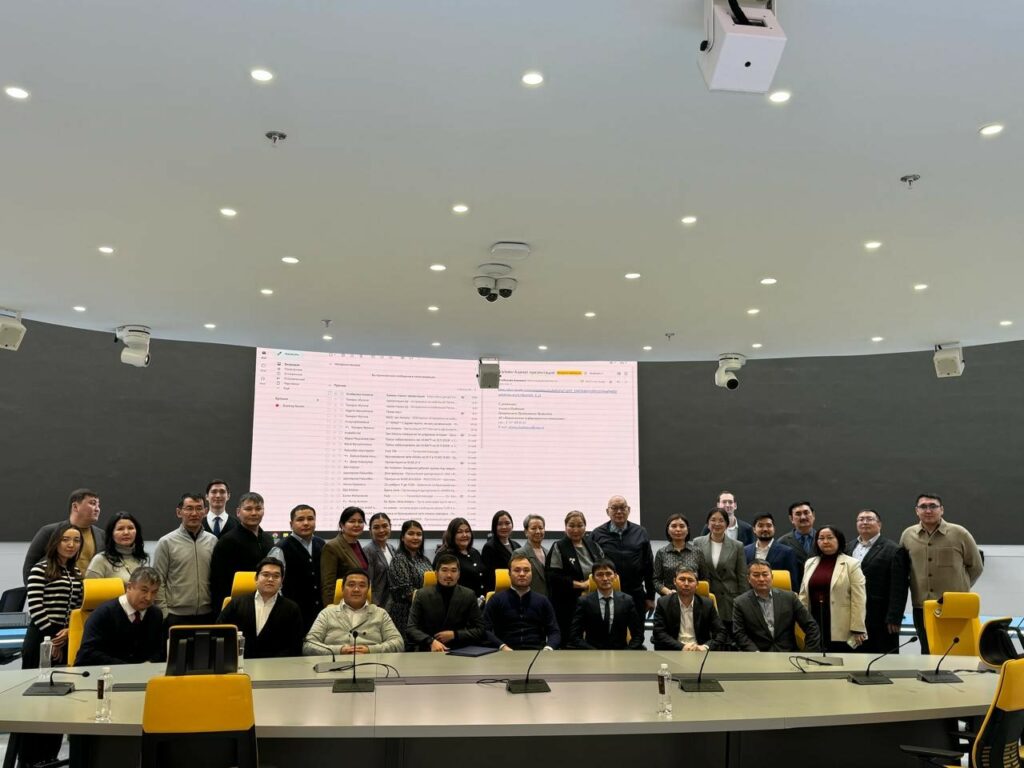
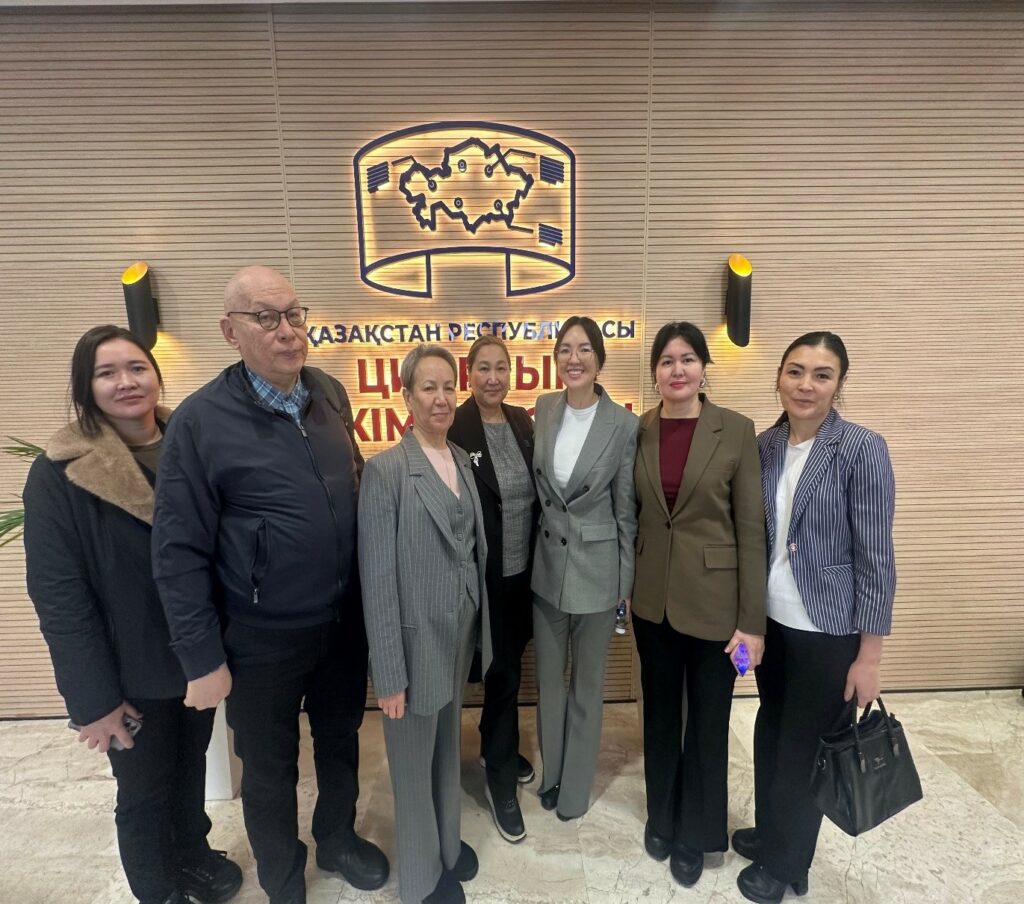
On December 13, 2024, the Economist + discussion platform discussed current issues of financial management: technology, tools, risks (online, offline).
The issues of risk management in the investment portfolio were shown by Sarenova Gulzhanat – teacher – practitioner of “Edutrade” school of trader, trader, expert on the stock market. The instruments of the stock market were shown in an accessible and understandable way using the example of the American market “Tramporalli” in such areas of the economy as the defense and energy sectors.
The instruments of hedging, risk reduction and the possibility of option transactions were shown.
The issues of managing cryptocurrency companies and funds such as iShares Bitcoin Trust (IBIT), which are currently experiencing significant growth, were of particular interest to doctoral and master’s students.
No less relevant financial management tool was the issue of insurance activities. The speaker of the insurance market was the regional director of Nomad Life in Astana, Mirat Zhekenov, who professionally revealed the issues of life insurance, guarantees of safety of insurance premiums, and preferential taxation regime.
At the discussion platform, doctoral students and professors of the Academy recommended some issues of regulation of this activity in order to form an alternative basis for managing various types of financial products, which in the future create the basis for increasing the assets of all types of financial markets in our country, using the experience of developed countries. Professors A.B. Zeinelgabdin, S.A. Dzhumbayev, doctoral students Kutumov N., Abuov Murat, master’s students Zhekenov Dulat, Sailaubek Ylylas, Raziyev Kadyr, Dzhayilganova Gulsheru and Moldakhmetova Perizat took an active part in the discussion in offline and online mode.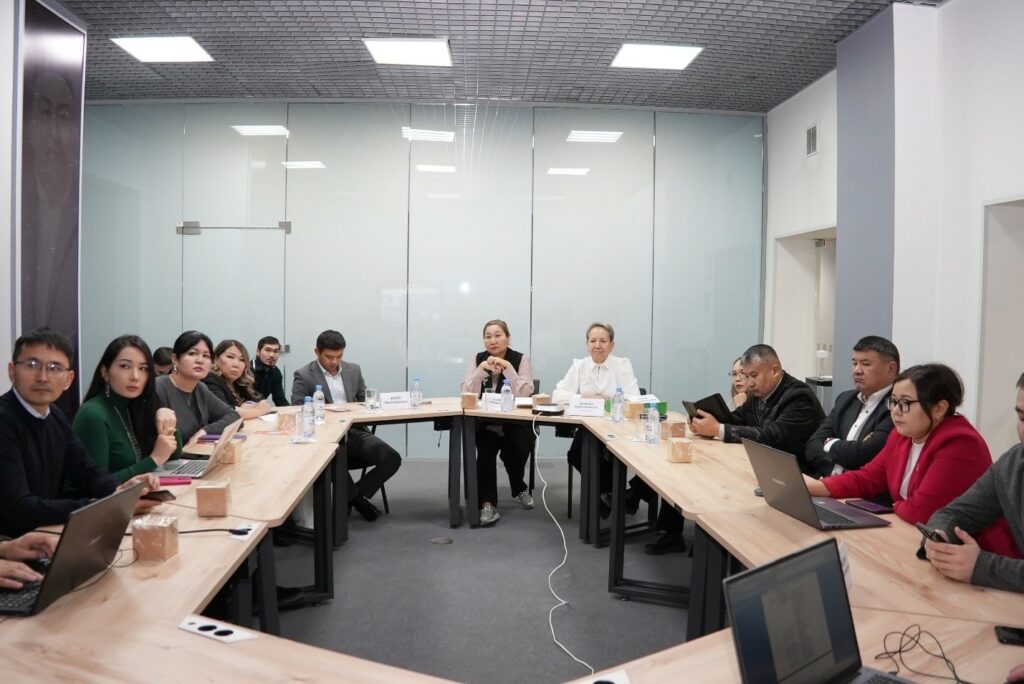
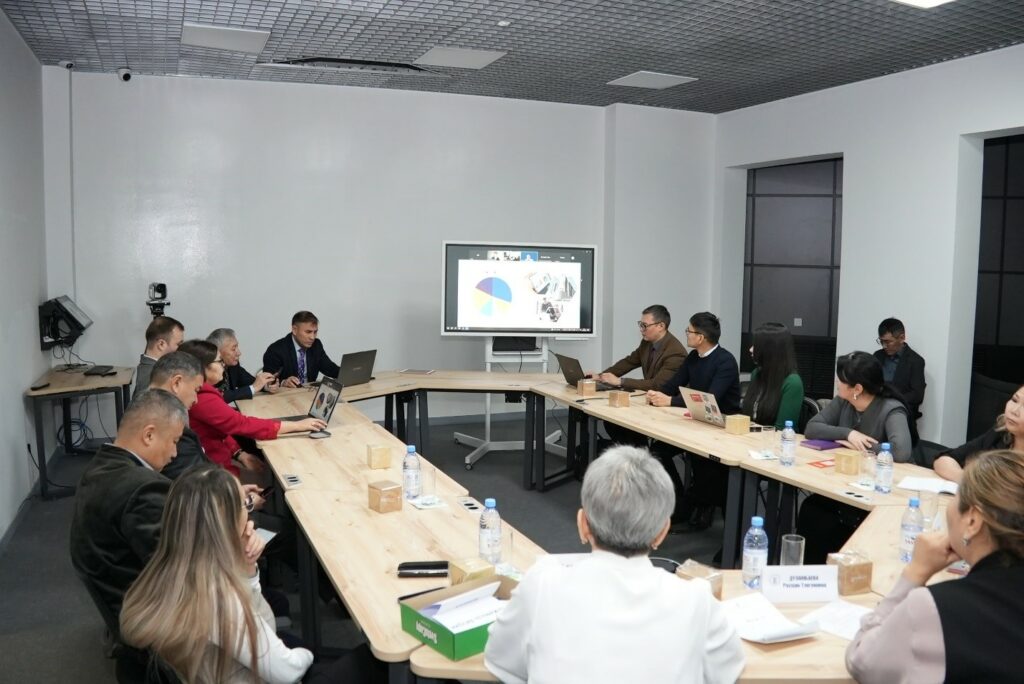
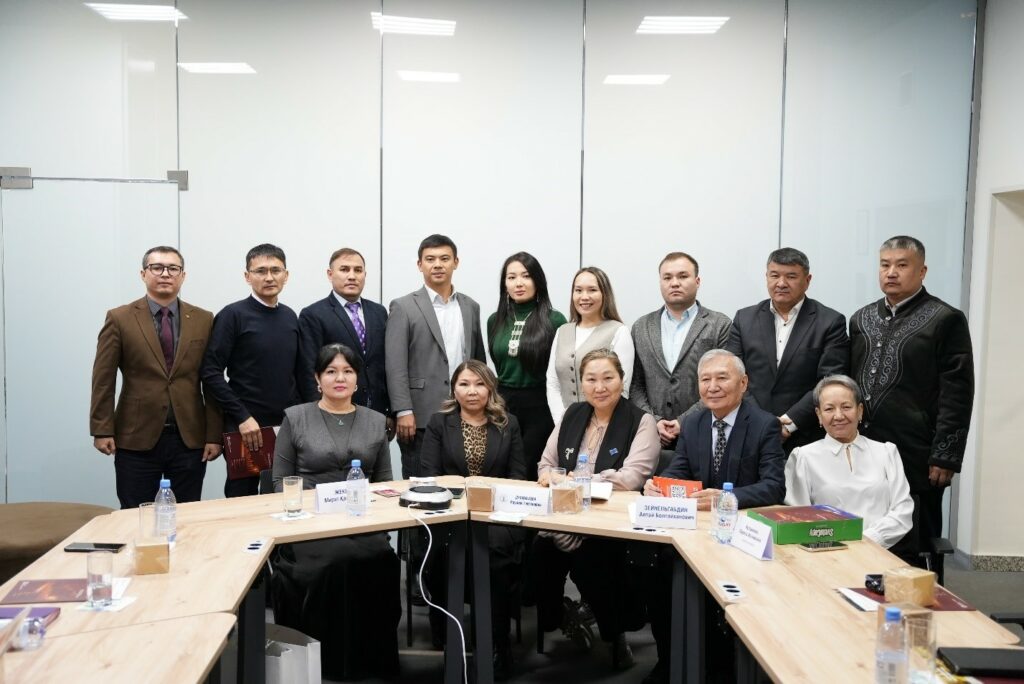
Reform of fiscal policy
On February 7, 2025, an active discussion was held on the issues of reforming the budget and tax policy (BNP) in the country, with the participation of experts, undergraduates, doctoral students, and Academy professors. Very sensitive issues related directly to the interests of entrepreneurs and the population were raised. Namely, a possible increase in VAT to 20%, lowering the threshold for VAT registration to 15 million tenge per year and reducing special tax regimes. One of the goals of the government changing the rules of the game is to address budget deficit issues. The results of the discussion can be divided into main points:
- It is necessary to determine the model of economic development, the initial data (existing conditions), the definition of the main priorities (investment, financial, trade, etc.), the sectoral structure of the economy, restrictions, opportunities, etc. Next, decide on the type of fiscal policy, its target orientation, capabilities, consistency with the country’s sustainable development goals, monetary policy, and social policy.
- It is important to answer the question: to what extent does the chosen type of economic policy correspond to the solution of urgent problems of short -, medium- and long-term development? The government’s proposed reform measures relate to the restrictive BNP, which is carried out in conditions of overheating of the economy, exceeding the GDP potential level in order to reduce business activity and fight inflation. However, one of the main targets of the proposed measures is to replenish the country’s budget. There are a number of questions about the feasibility of implementing the reform because the type of policy does not quite correspond to the task at hand. There are golden rules for developing economic policy – consistency of goals, tools, and results. If there is a violation of the matrix management system, then we are talking about a system error and the corresponding consequences that have a high cost to society.
- It is important to determine the degree of risk coverage by results. We are talking about calculations, risk identification and assessment, and risk management systems. In this spectrum, it is advisable to analyze the regulatory impact. It is possible to present possible risks in general, without going into a differentiated analysis for each type of risk: – VAT is a complex tax that falls on both the consumer and the producer (in fact). Because business payments are made in advance, and the business may not always make a set-off.
– higher prices, inflation, and with a multiplicative effect;
– reduction of the tax base, an additional 300 thousand companies (representatives of SMEs), an increase in non-repayable debts;
– social inequality, tension, conflict;
– unemployment, a bankrupt business will join the ranks of the unemployed;
– development of shadow business, fragmentation of companies, etc.
- There is a need for a systematic approach to reform based on research, evaluating the effectiveness of the existing mechanism of the budget and tax system, compliance with the basic principles of taxation (certainty, fairness, etc.), and forming a bank of errors and their critical analysis. After that, it is advisable to talk about new rules for managing complex socio-economic systems.
- It is necessary to take into account all risk factors when developing the BNS reform policy and activate alternative sources of budget replenishment, and internal reserves. The most important areas are: effective asset management (government spending), illegal imports, capital amnesty, balance of the tax burden by industry, etc.
Today, it is necessary to develop a balanced budget and tax policy focused on the development of the economy of Kazakhstan.
The club’s leaders are Professors R. T. Dulambaeva and L. I. Kusainova.
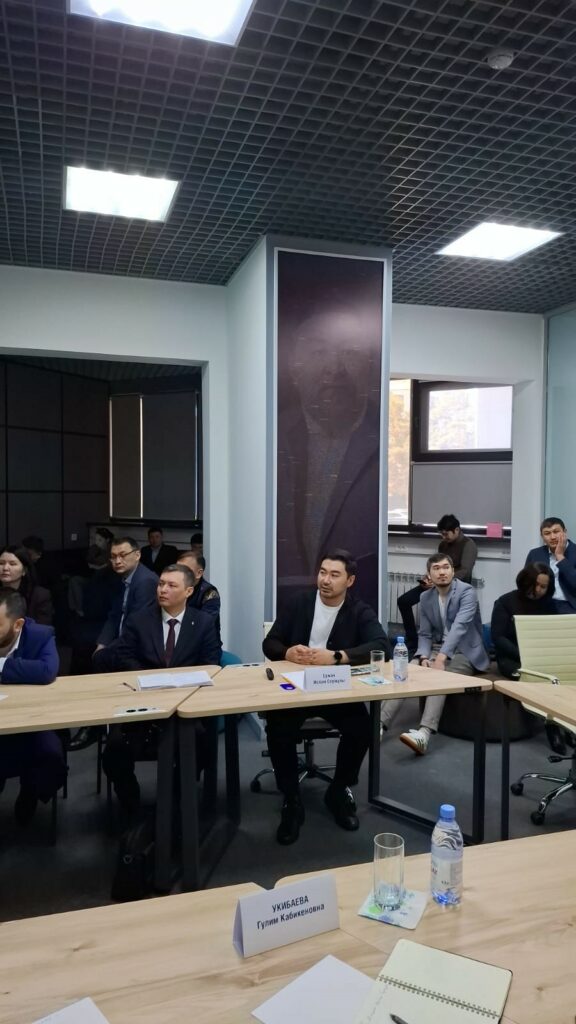
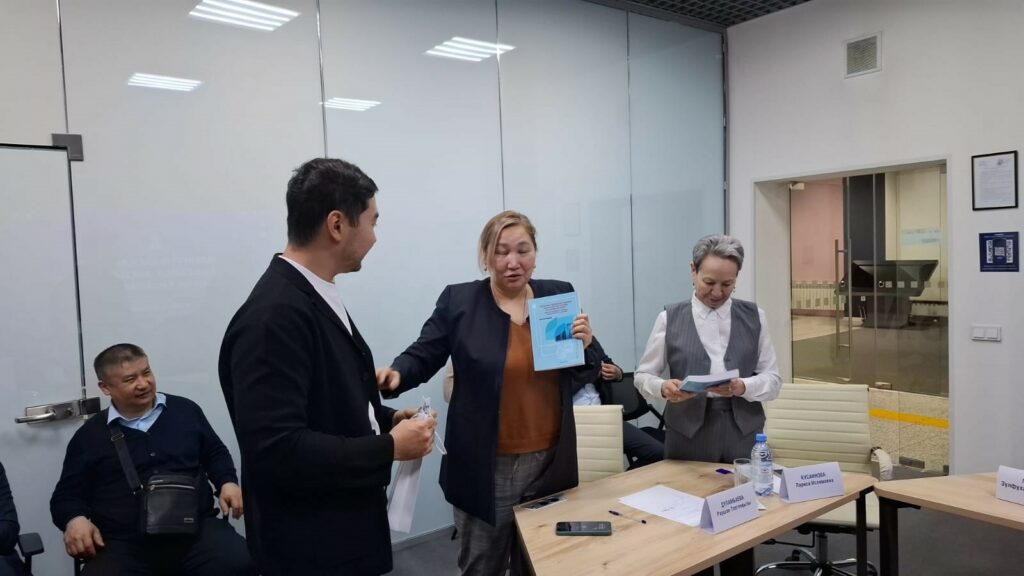
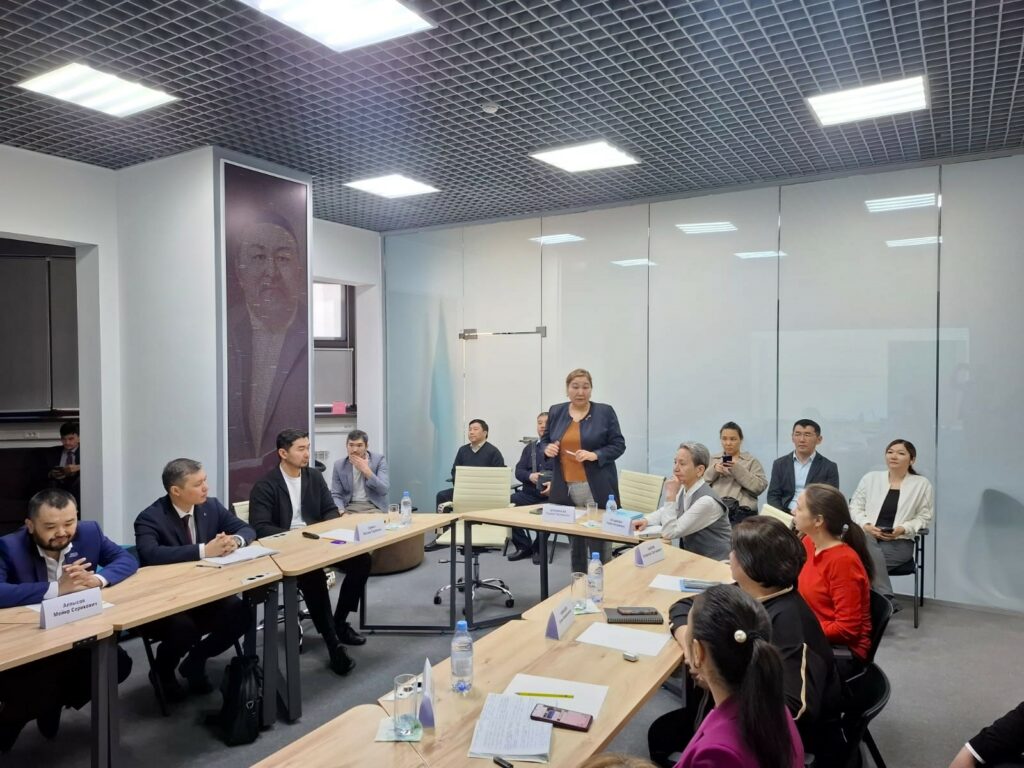
On March 14, 2025, a meeting of the Economist+ club was held in the format of a scientific and methodological seminar on the topic “WRITING A MASTER’S PROJECT: LIFE HACKS FROM EXPERTS”.
* The head of the club ” Economist+”, Doctor of Economics, Professor R. T. Dulambayeva reviewed the goals and objectives of the seminar and revealed the main components and rules for writing a master’s project. The main objectives of the scientific and methodological seminar:
– Development of research competencies, deepening knowledge of the methodology of scientific research and high-quality preparation of a research/master’s project
– Discussion of current scientific problems and search for solutions
– Develop the skills of scientific discussion, presentation of results and participation in scientific research
– Exchange of information, receive feedback from experts, establish new contacts
Format of the event – discussion with experts of master’s / doctoral projects
* Form of control – pre-defense of research projects (master’s, doctoral)
* Opportunities – involvement in research projects, writing scientific articles, participating in conferences
In their presentations, experts shared their life hacks on high-quality research:
– Балгарина Lyudmila A. Balgarina, Head of the Department of Structural Statistics of the Department of BNS ASPR of the Republic of Kazakhstan for North Kazakhstan Region
– Yessenzholova Gaziza Dosmaganbetovna Chief Expert of the Administration of Customs Procedures and Cleaning Department of the Customs Control Department of the State Revenue Committee of the Ministry of Finance of the Republic of Kazakhstan
– Абдрахманова Dinara Abdrakhmanova, 1st year doctoral student at DE24
Possible directions for further scientific research and recommendations, summing up the results were made by Professors of the Institute of Management Kusainova L. I., Ukibaeva G. K.
The club’s leaders are Professors R. T. Dulambaeva and L. I. Kusainova.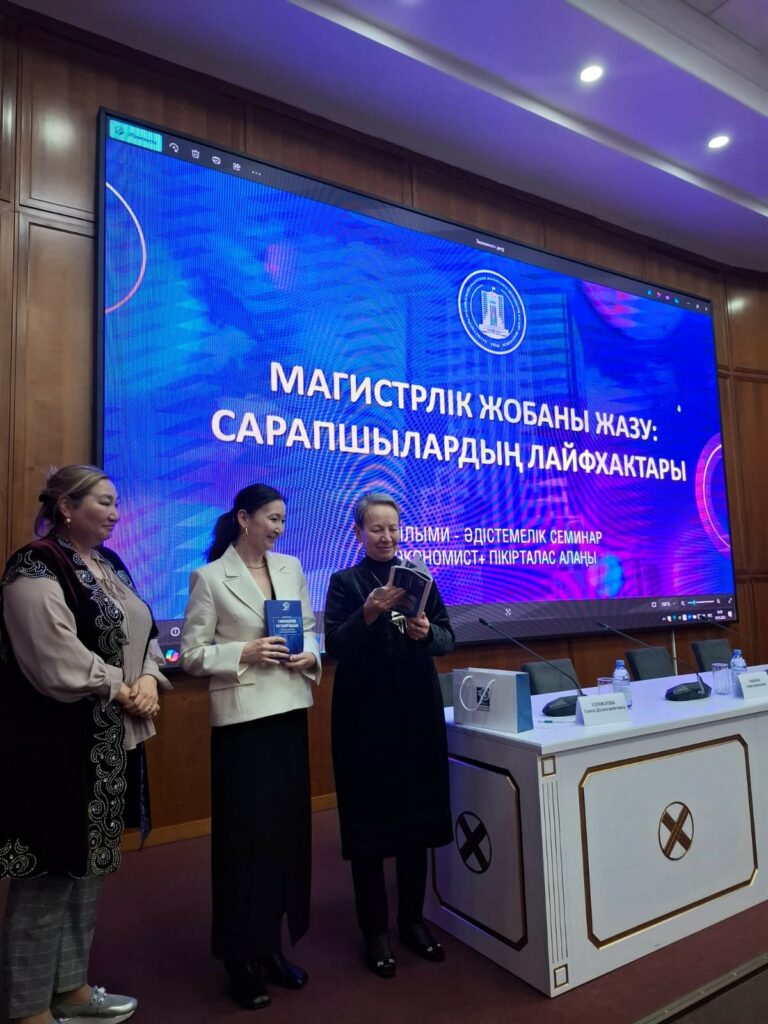
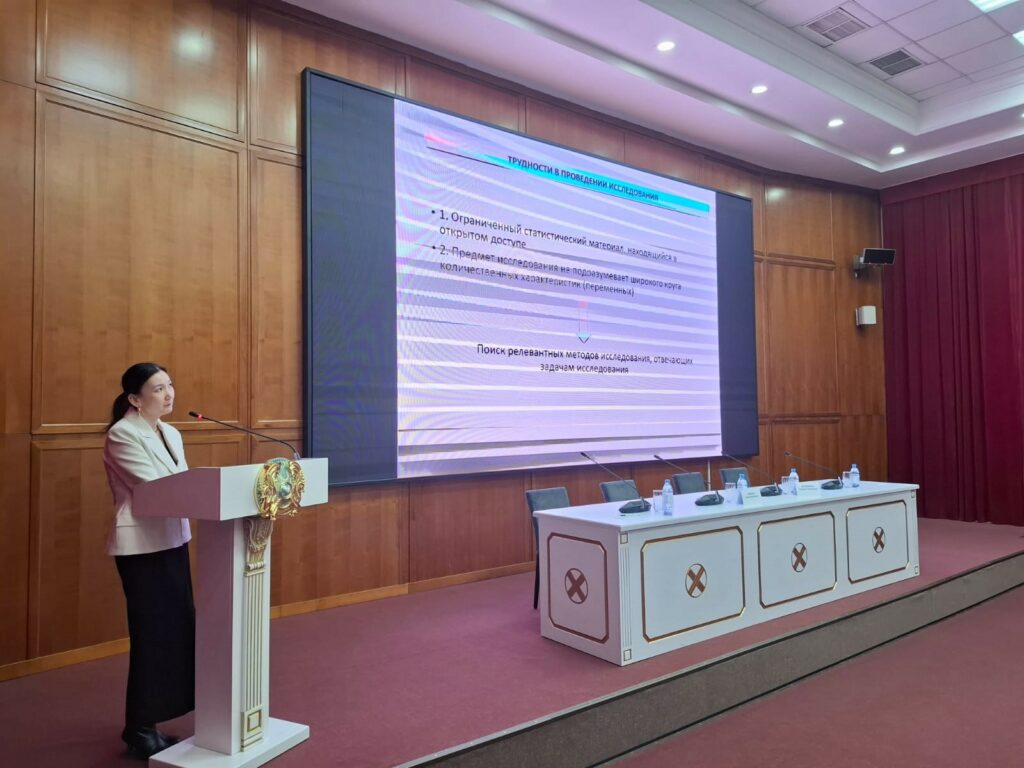
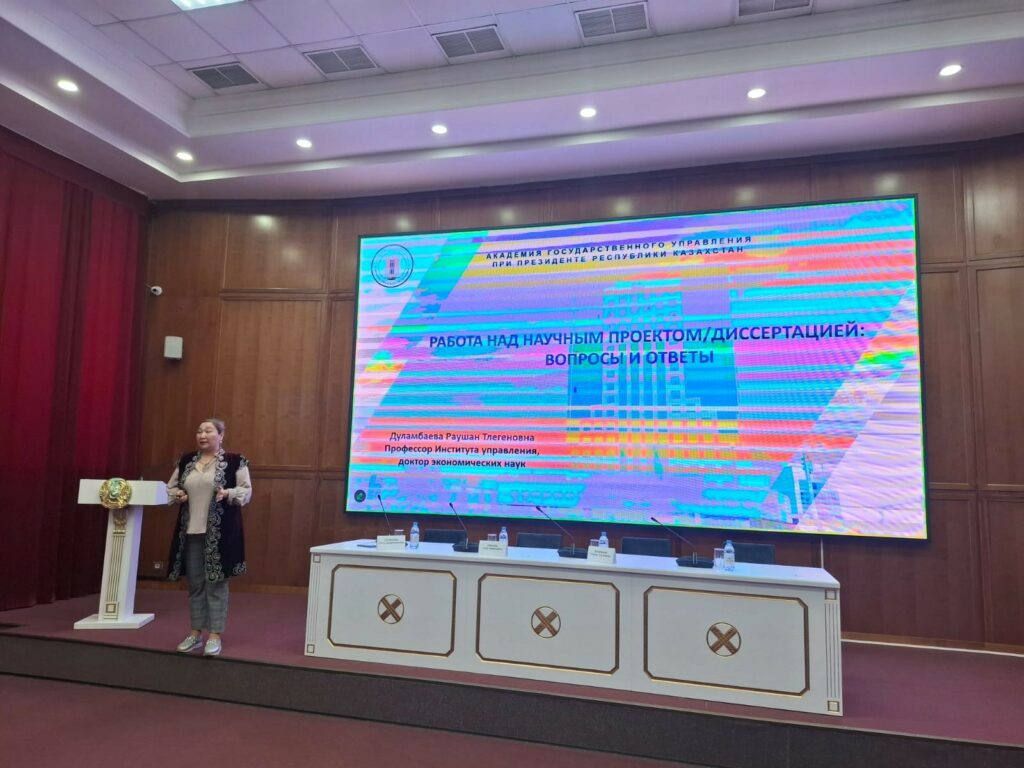
On March 28, 2025, a scientific and methodological seminar on the topic “Monetary policy of modern Kazakhstan” was held at the Economist+ platform for undergraduates, doctoral students, and teachers of the Academy. Yerzhan Islam, Deputy Head of the Department of Macroeconomic Research and Forecasting of the Monetary Policy Department of the National Bank of Kazakhstan spoke on the problems of using instrumental methods for analyzing and evaluating monetary policy. As part of the implementation of master’s projects, 2nd-year undergraduates of the speciality Economics Alpysov Meir, and Demesheva Torgyn presented the results of their research for discussion. Topical issues of assessing the impact of imported products on food inflation in the Republic of Kazakhstan and the effectiveness of Kazakhstan’s credit policy were raised. Experts – Yerzhan Islam, representative of the National Bank of the Republic of Kazakhstan, moderator of the seminar: Professor R. T. Dulambayeva, Professors of the Academy A. B. Zeynelgabdin, L. I. Kusainova, G. K. Ukibayeva, A. S. Nurmagambetov, Deputy Chairman of the Board of Directors. Directors of the Institute of Applied Research Shayakhmetova Sh. T., teachers Tlebaldina N.E., and Dosmagambetova A.M. asked questions directly related to the problems of research, design, goal setting, tasks, novelty of projects, and the quality of the experimental part of the work. Specific recommendations were proposed to strengthen the methodological and evidence-based part of the research results.
The scientific and methodological seminar strengthened professional communication between participants and allowed them to exchange experience in conducting research, develop specific proposals for government agencies, and outline plans for further work.
The club’s leaders are Professors R. T. Dulambaeva and L. I. Kusainova.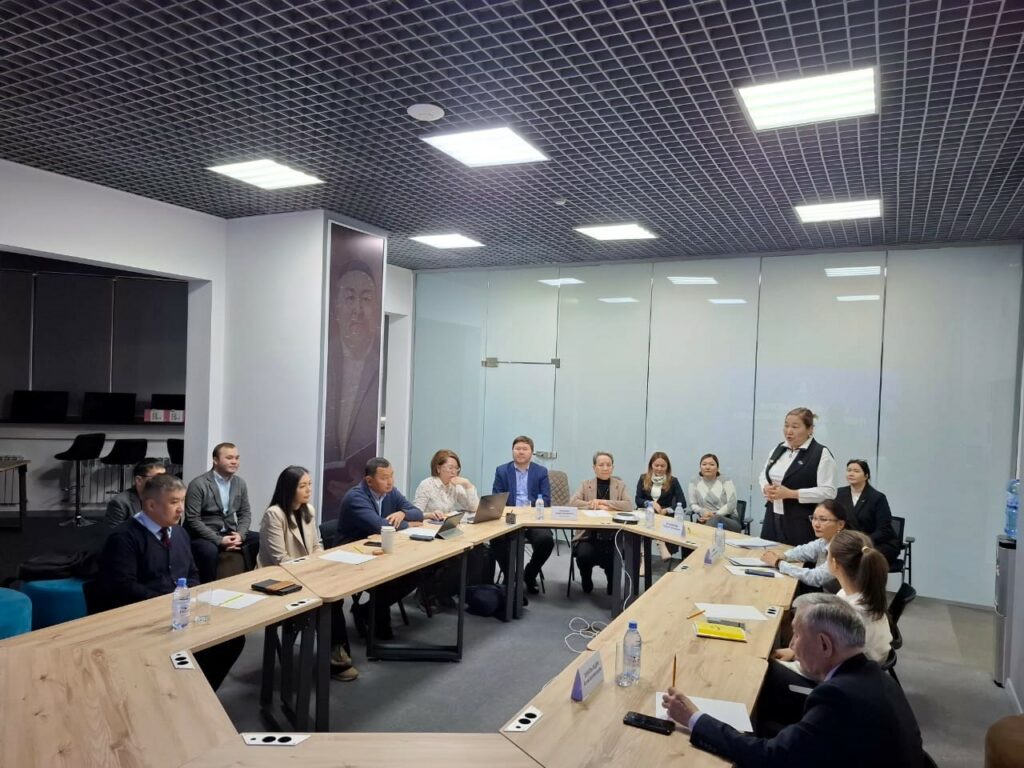
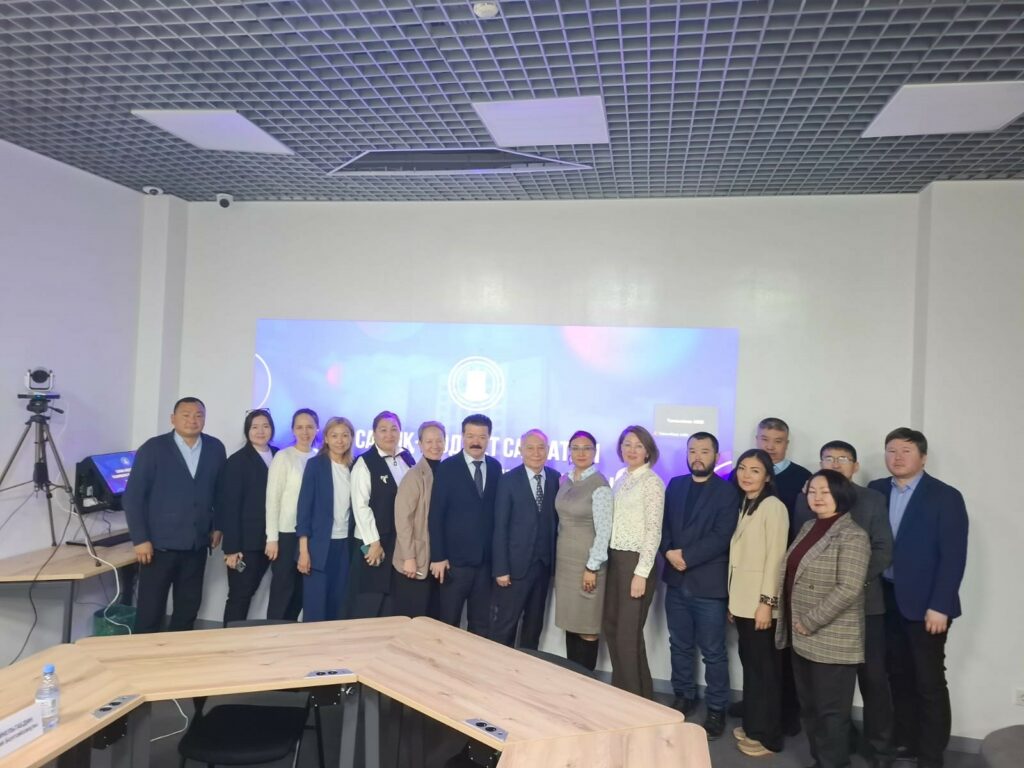
On April 25, 2025, the round table “Modern Approaches to Fiscal and Monetary Policy Coordination: A Dialogue of Experts” became a significant platform for constructive dialogue. Representatives of central and local executive bodies, the scientific community, experts and analytical centres in the field of macroeconomic regulation gathered to discuss key issues. The purpose of the event was to promote the formation of coordinated approaches to the coordination of fiscal and monetary policies, as well as to strengthen the capacity of public authorities.
I would like to note a fairly high level of presentations by experts who presented meaningful content in their presentations. Thus, Director of the Monetary Policy Department of the National Bank of the Republic of Kazakhstan Orazalin Rustem considered in detail the problems of developing and implementing fiscal and monetary policy, while the conclusions were based on the principles of Evidence-based policy.
- Orazalin’s speech was devoted to the analysis of imbalances between monetary policy and fiscal policy, their impact on inflation, economic growth and the stability of public finances. The expert noted that monetary policy cannot effectively fight inflation as long as fiscal policy remains pro-inflationary. A number of recommendations were proposed: strengthening budget rules (targeting non-oil deficits); improving the quality of government spending and tax discipline; reform of the National Fund: accumulation of assets, reducing budget dependence on oil revenues; synchronization of monetary and fiscal policies to reduce inflation and sustainable growth.
Chief Consultant of the Macroeconomic Policy Department of the Agency for Strategic Planning and Reforms of the Republic of Kazakhstan Eskendirov Adlet updated the issues of improving the rules of budget planning and forecasting. According to the rules and objectives of fiscal policy, an interesting study was presented by Doctor of Economics, Professor, Chief Researcher of the Institute of Economic Research JSC Alpysbayeva Sara Nurbekovna. Bali presented the results of a study on the problems of determining the maximum levels of tax burden using fiscal analysis methods, taking into account the time lag in the implementation of tax reforms.
Scenario models with risk and cost calculations are needed to manage the use of monetary and fiscal tools. Akhmedyarova Akbobek, Director of the Center for Economic Modeling DevelopmentАкбобек, presented various models for managing budget and monetary processes, scenarios for the consequences of coordinated and uncoordinated policies, and proposed an algorithm for developing and implementing monetary and fiscal policies.
Aigazin Zhanibek, General Director of AERC, spoke about the main characteristics and basic conditions of functioning of the national macro Айгазин Жанибекsystem. The issue of the need to improve the efficiency of state asset management and develop a coordinated policy in the field of regulating monetary and budgetary processes is updated.
It was very interesting to hear different points of view from representatives of government, science and analytical centers, professors of the Institute of Management Zeynelgabdin A. B., Kusainova L., Ukibaeva G., doctoral students, and undergraduates of the Academy. It is particularly valuable that practical solutions for improving the effectiveness of the country’s economic policy were discussed. Based on the results of the round table, recommendations will be developed in the form of an analytical note.
The club’s leaders are Professors R. T. Dulambaeva and L. I. Kusainova.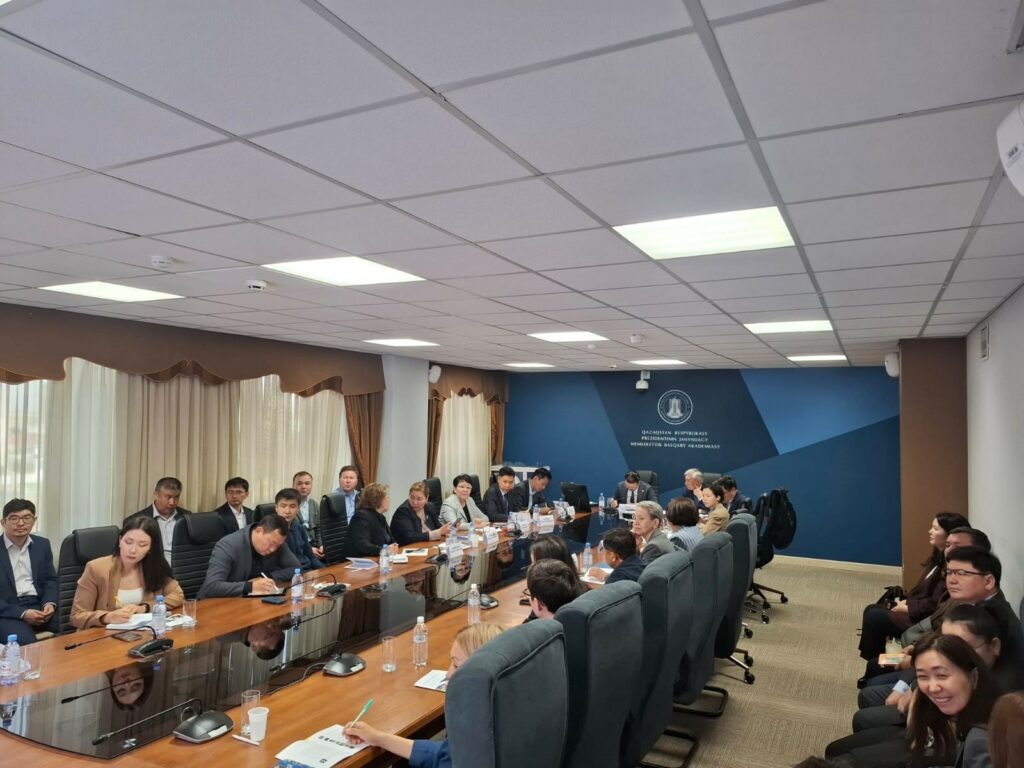
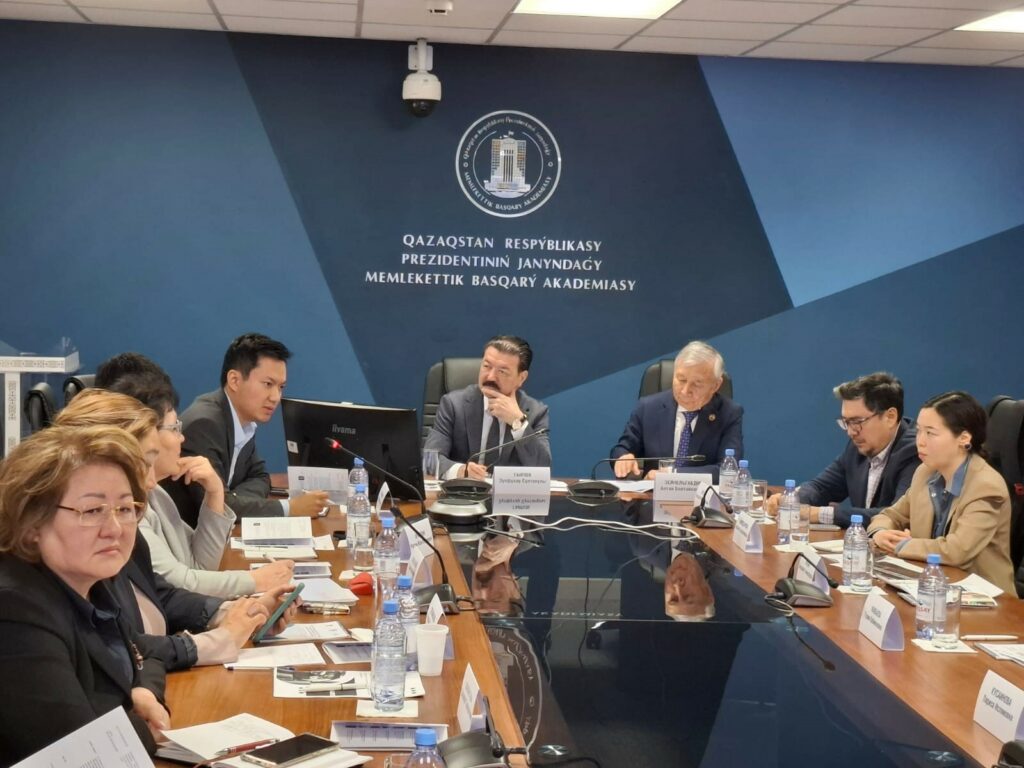
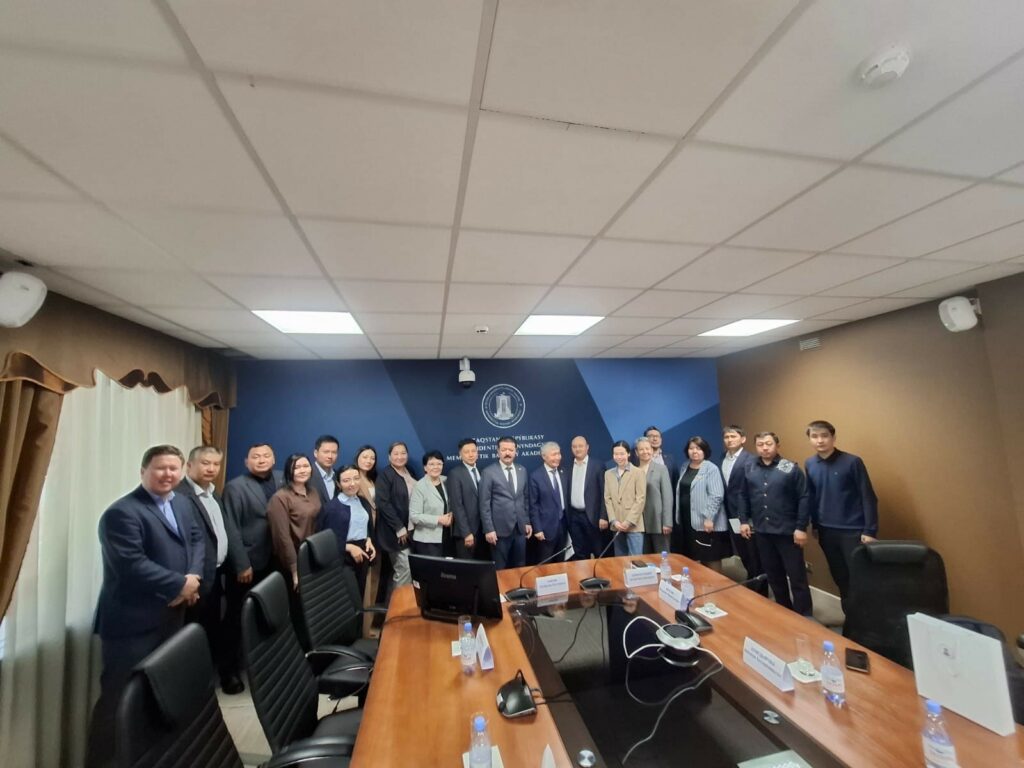
On May 13, 2025, an off-site meeting of the Economist + club was held at the S. Seifullin Kazakh Agrotechnical Research University (KazATIU). A round table was held on the topic “Interdisciplinary approaches to ensuring food security”.
The initiators were:
– Ministry of Agriculture of the Republic of Kazakhstan
– NAO “National Agrarian Research and Educational Center”
– КазАТИУS. Seifullin KazATIU, ASU under the President of the Republic of Kazakhstan and Astana International University
Vice-rector for Research and Innovation Yerzhan Syrgaliyev delivered a welcoming speech.
During the plenary session:
– Professor of the Academy of Public Administration under the President of the Republic of Kazakhstan Raushan Dulambayeva spoke about the role of DM in food security and in ensuring management processes
– Professor of Astana International University Serik Jumabayev shared his experience in implementing analytics in management
– A monograph, a training manual and the current digital platform on PB (project AP14871923)are presented
KazATIU professors Laura Auteleeva and Darima Zhenshan outlined strategic directions in agricultural policy.
Key conclusion: interuniversity cooperation is the basis for sustainable solutions
Combining the efforts of the agricultural, managerial, and educational sectors makes it possible to find comprehensive and scalable responses to food security challenges.
The event became a platform for exchanging experience, strengthening networking and developing joint projects between universities.
The discussion was actively attended by undergraduates of the ASU under the President of the Republic of Kazakhstan majoring in Economics ME-24, doctoral students and undergraduates of KazATIU.
The club’s leaders are Professors R. T. Dulambaeva and L. I. Kusainova.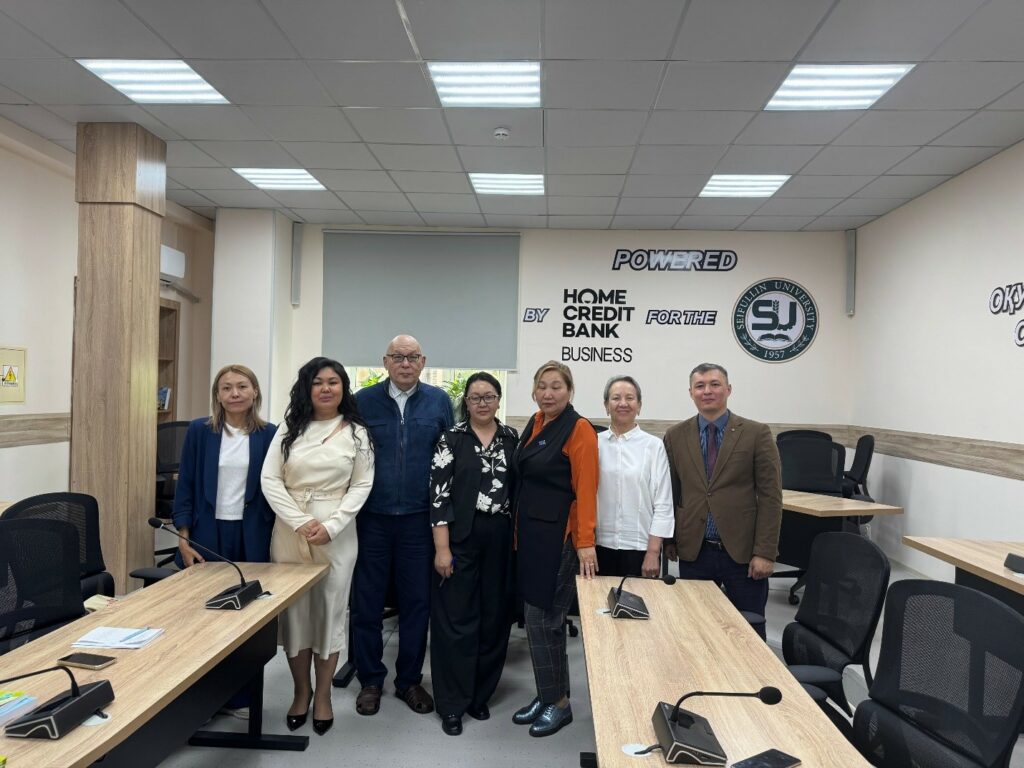

On May 16, 2025, the final expert meeting of the Economist+ discussion club was held on the topic: “Non-monetary motivation of civil servants”. The event was the final one in the current academic year and was devoted to discussing current approaches and developing recommendations for improving the system of non-monetary motivation in the civil service.
In the context of limited budgetary resources and increasing demands on the efficiency of public administration, non-monetary incentives are becoming particularly relevant. The discussion focuses on the development of internal motivational mechanisms, and the formation of institutional and regulatory foundations for their application in the public service system.
The meeting was moderated by Doctor of Economics, Professor R. Dulambayeva. Aidar Kazybayev, Managing Director of the National Academy of Corporate Governance, and Botagoz Buralkieva, researcher, coach and expert in the field of personal effectiveness, took part as invited experts.
Botagoz Buralkieva presented the results of her research in the field of non-monetary motivation, as well as practical recommendations aimed at strengthening non-monetary incentives for public sector employees. At the end of the presentations, the participants actively participated in the discussion in the format of focus groups, during which they developed proposals for the institutionalization and promotion of non-monetary motivation mechanisms.
Representatives of the Agency of the Republic of Kazakhstan for Civil Service Affairs — Usenova G., Abdanbekov A., Nurmagambetov D., as well as undergraduates of the Human resource Management (HR) program, who made specific proposals and initiatives, actively participated.
In his closing speech, Professor A. P. Zeynelgabdinsuggested continuing work in this direction and specifying recommendations for state bodies, emphasizing the strategic importance of the issue under discussion for reforming the civil service system.
At the end of the meeting, symbolically emphasizing the importance of recognizing professional achievements as an element of non-monetary motivation, the participants were presented with monographs and textbooks by the author’s team: Professors R. Dulambayeva, S. Zhumabayeva, L. Kusainova, D. Nurmagambetov. Etc. On the balance of fiscal and monetary instruments of macroeconomic regulation
The club’s leaders are Professors R. T. Dulambaeva and L. I. Kusainova.